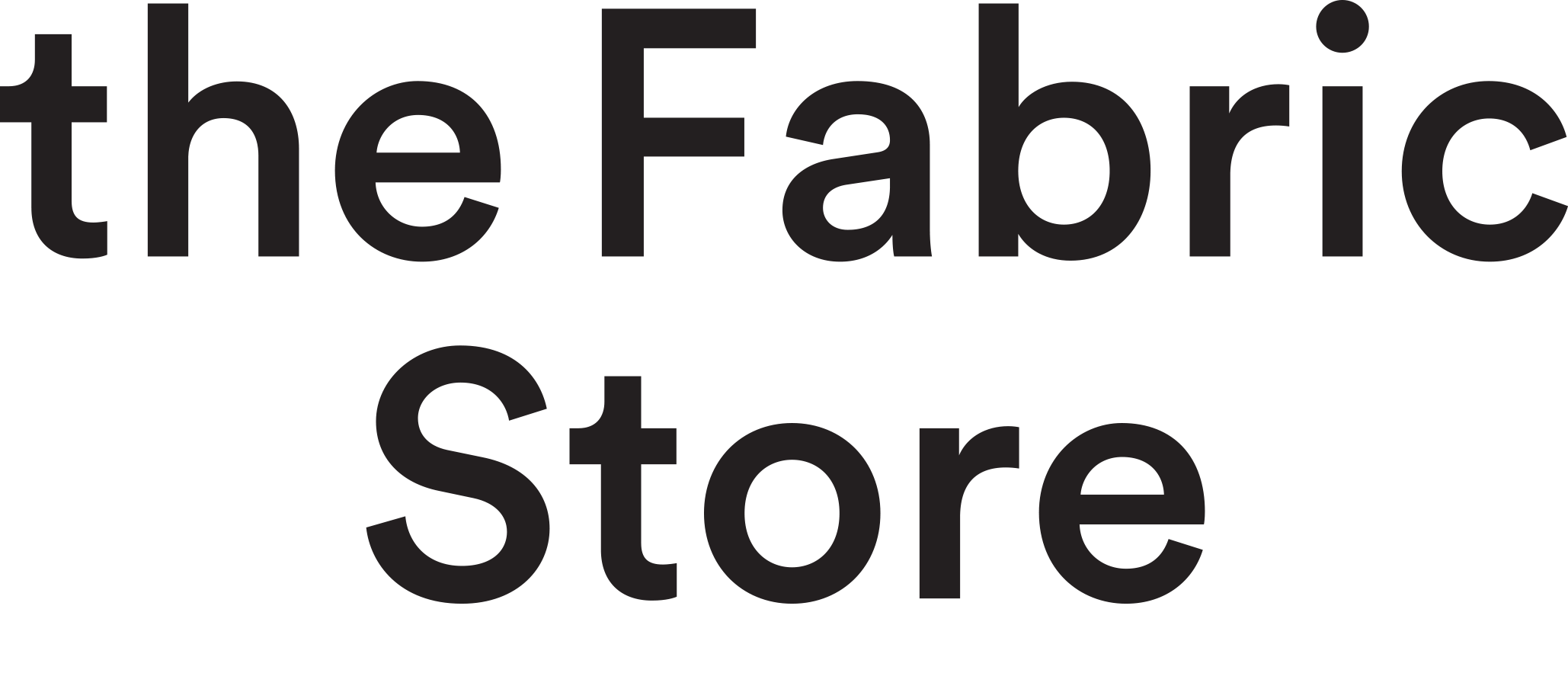1 — Block fusing and Pre-Pressing
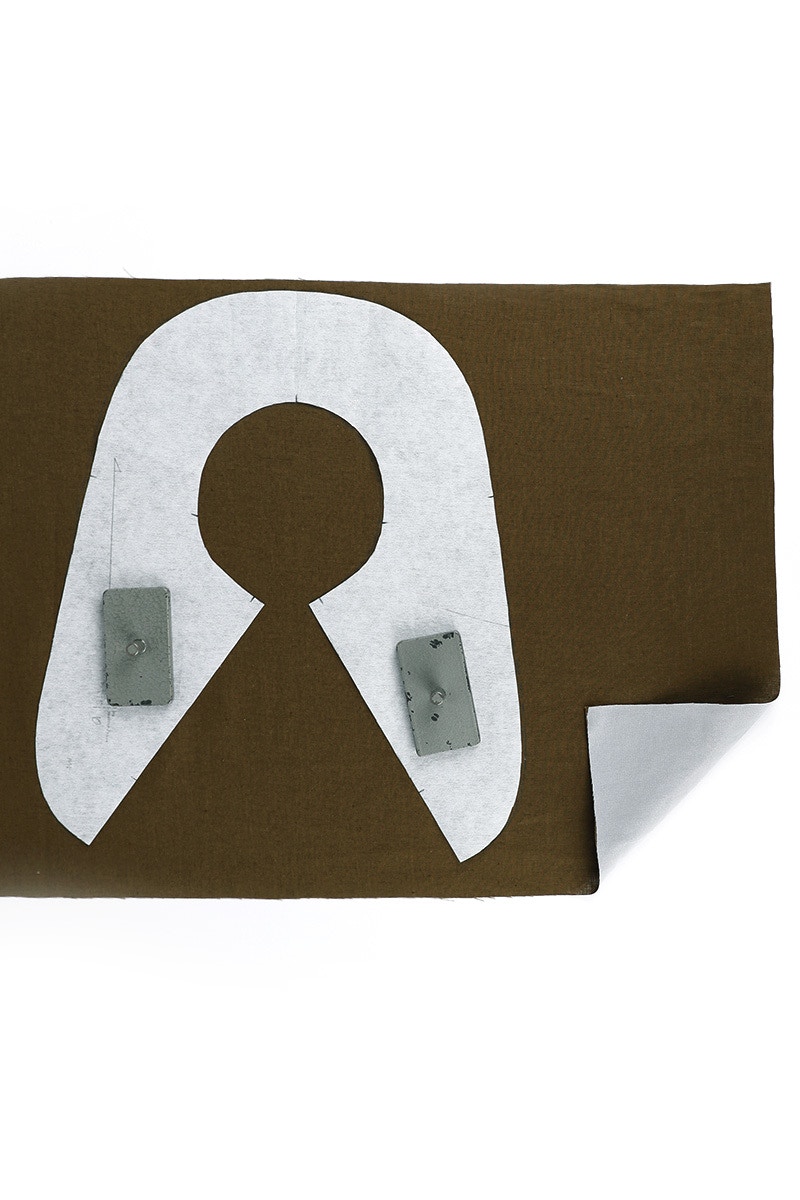
To ensure accuracy, and to save time, we recommend block fusing some of your pattern pieces before sewing. Block fusing is when you apply fusible interfacing to a section of the fabric before cutting out the pattern pieces. Doing it this way means your pieces won’t stretch out of shape, which can happen if you piece fuse after. It also saves a bit of time as you only need to cut out once!
The pieces that require block fusing differ depending on the view and options you are sewing. They are indicated on the pattern and below:
Collar Options
Peter Pan — Top Collar and Neck Facing pieces
Round Neck — Neck Facing piece
Tie Back — Tie Back Collar and Back Neck Facing pieces
Sleeve/ Cuff Options
Button Cuff pieces
Tie Cuff pieces
Sleeveless Armhole Facing pieces
If you do not wish to block fuse, you can piece fuse these pattern pieces. This means cutting out each pattern piece in both interfacing and your main fabric and then applying the interfacing to each piece separately. If you choose to piece fuse keep your pattern pieces close by for reference and make sure they don’t stretch out of shape.
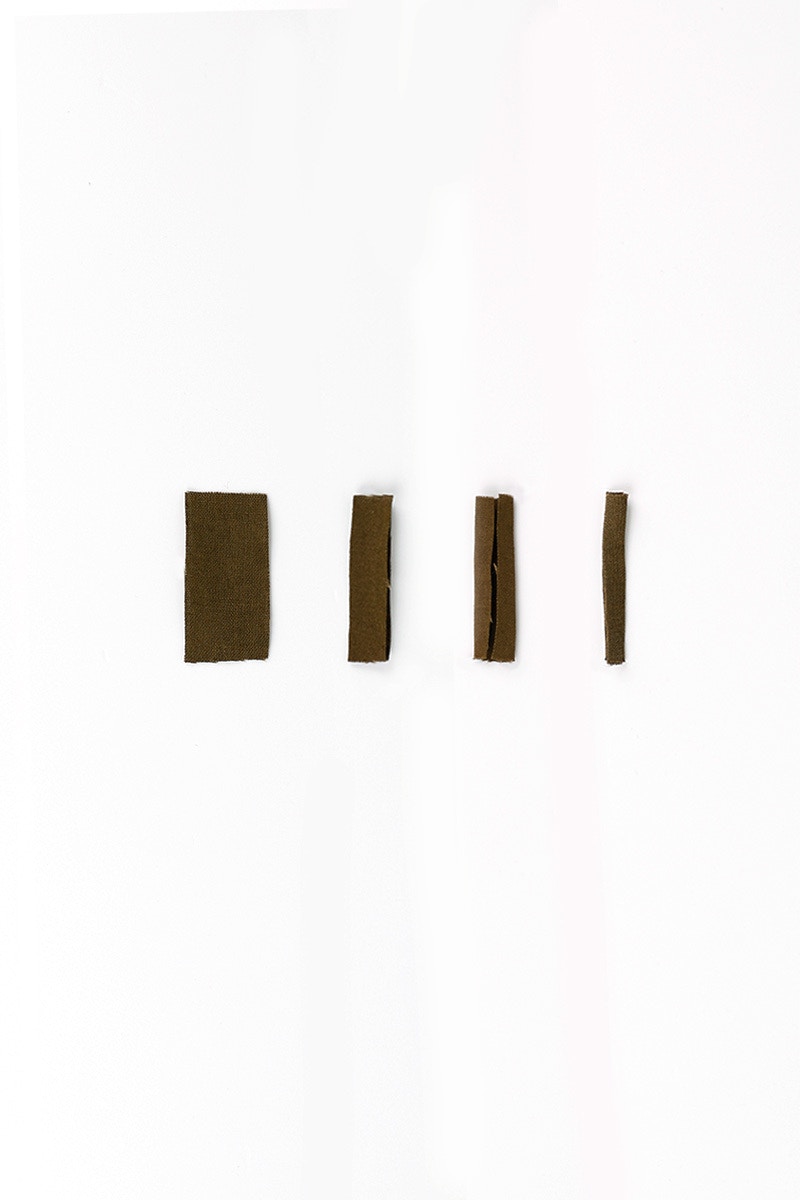
We strongly recommend that you use an iron to press some areas of your pieces before you begin sewing. This will help to ensure accuracy as you sew, as well as aid in giving your Ivy Dress or Top a neat and tidy finish. These pressing guidelines apply to both the Dress and the Top views.
Press the button loop in half lengthways, wrong sides together. Open out, then fold the outer edges to meet at the centre crease line. Fold in half lengthways and press again. Your finished pressed piece will measure 6mm in width.

If sewing the tie back collar, fold the collar in half lengthways, wrong sides together and press.
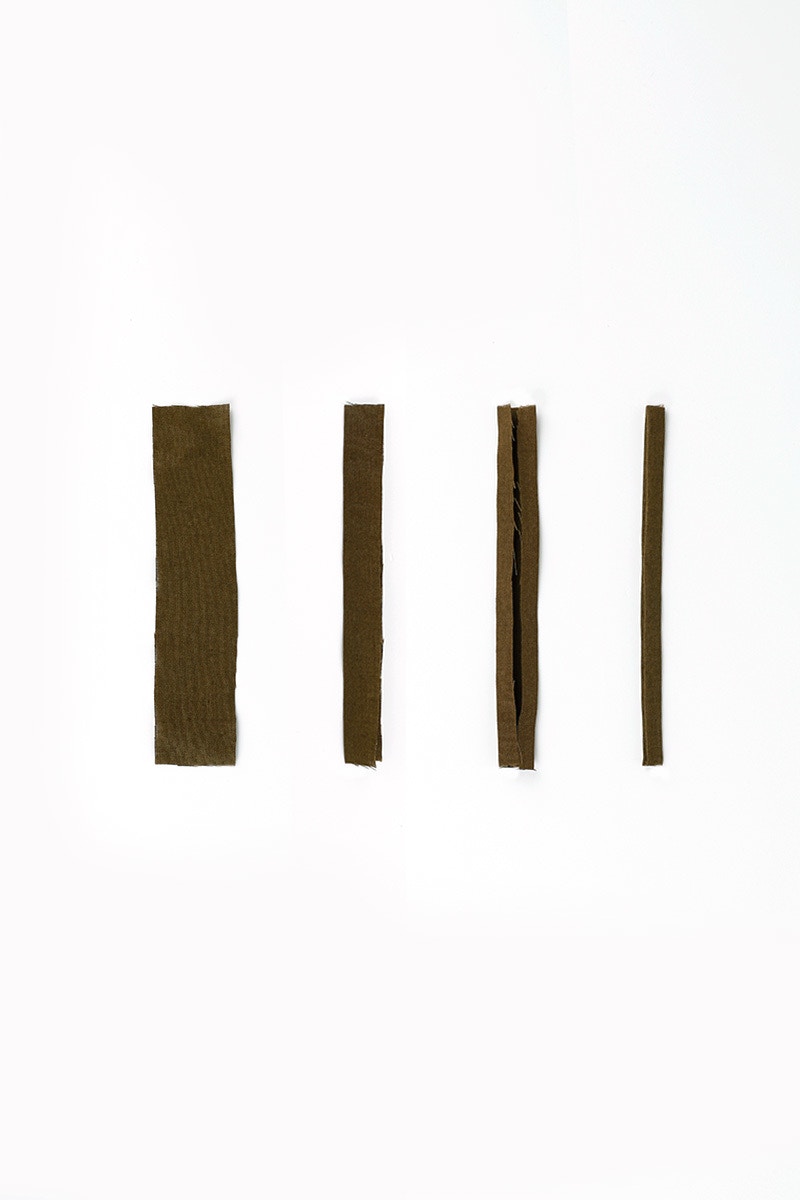
If sewing a long sleeve option, fold the sleeve placket binding pieces in half, press wrong sides together and press. Open out, then fold the outer edges to meet at the centre crease line. Fold in half lengthways and press again. Your fnished pressed piece will measure 1cm in width.

If sewing the button cuff option, take the cuff pieces and fold them in half lengthways with the wrong sides together. Press.

If sewing the tie cuff option, take the cuff pieces and fold them in half lengthways with the wrong sides together. Press.

If sewing the Dress view, fold the side pocket pieces in half at centre notches with right sides together and press.


If sewing the Dress view, take the skirt centre panels, and the skirt side panels and fold back the 1cm hem seam allowance, then press. Next fold the hem up a further 8cm as indicated by the notch and press.
2 — Sew the Bodice
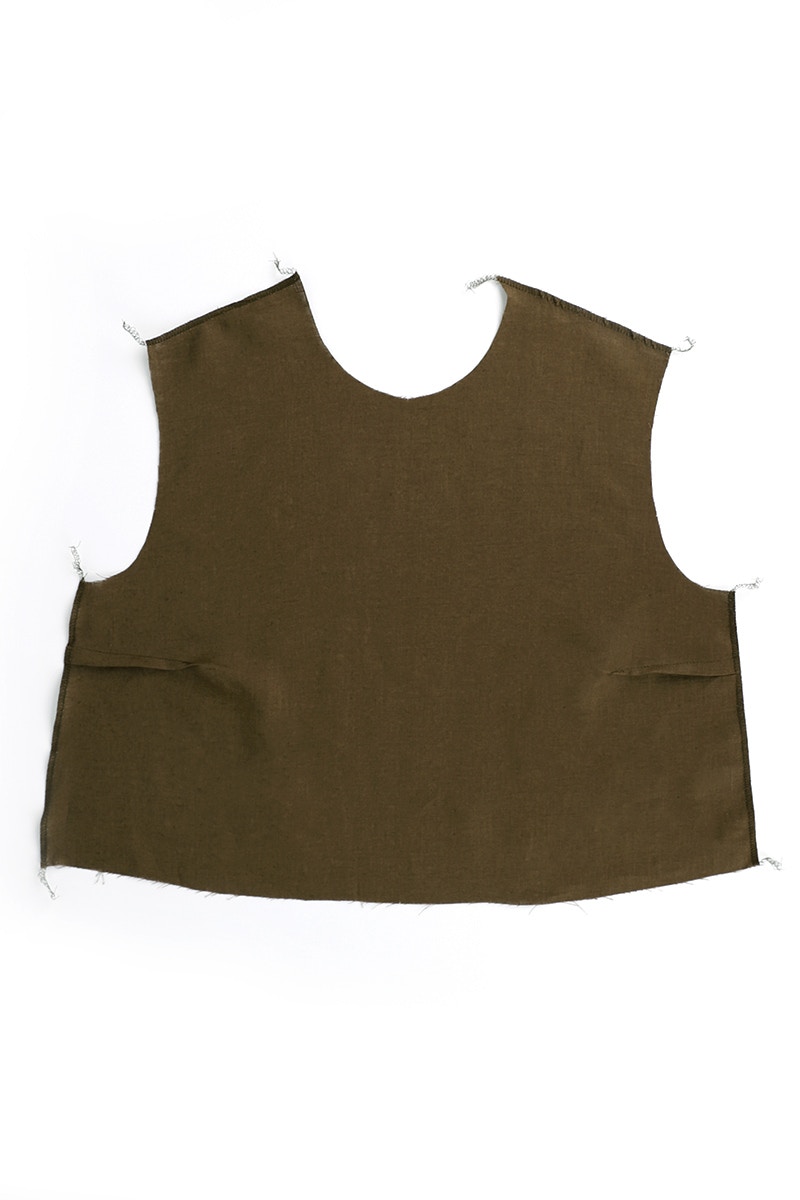
First, stay stitch the front bodice neckline.
Then, on the front bodice, pin the darts and sew them from the side seam, towards the dart point. Press the dart excess down. Neaten the sides and shoulders of the front bodice.
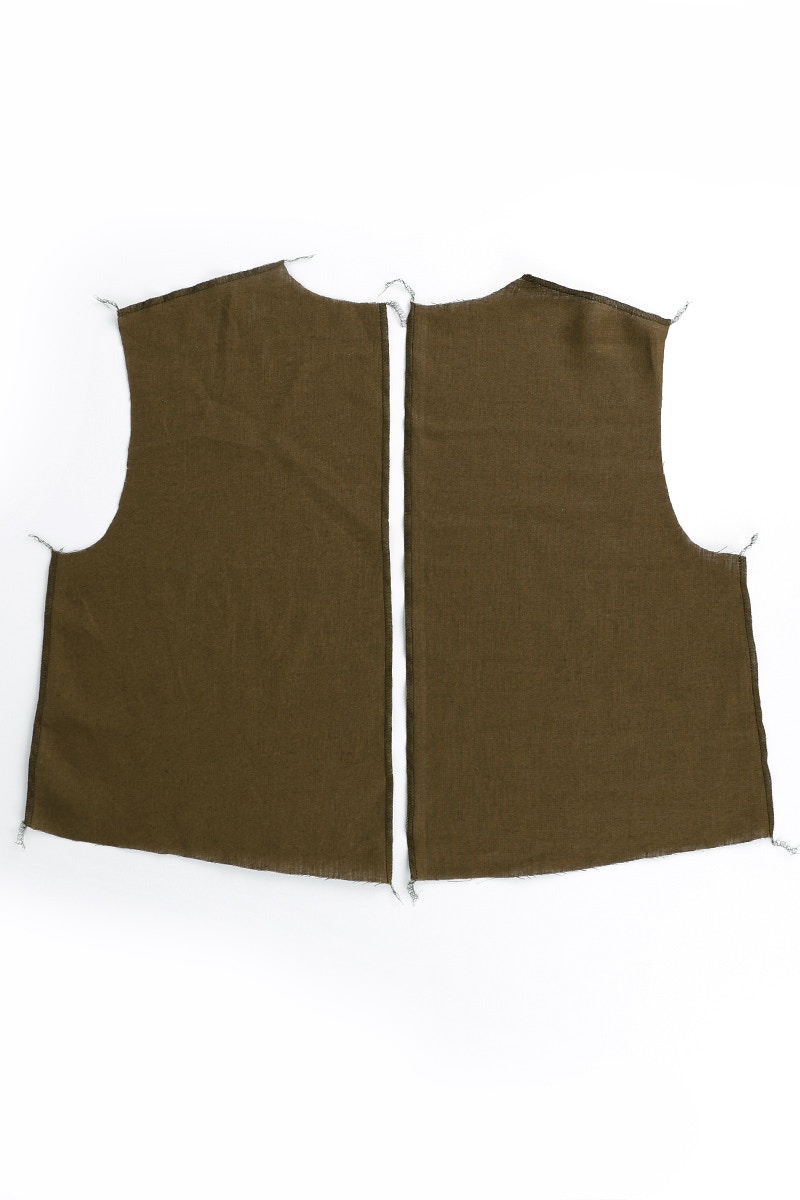
Stay stitch neckline of back bodice pieces.
Neaten the sides, centre back and shoulder edges of the of back bodice.

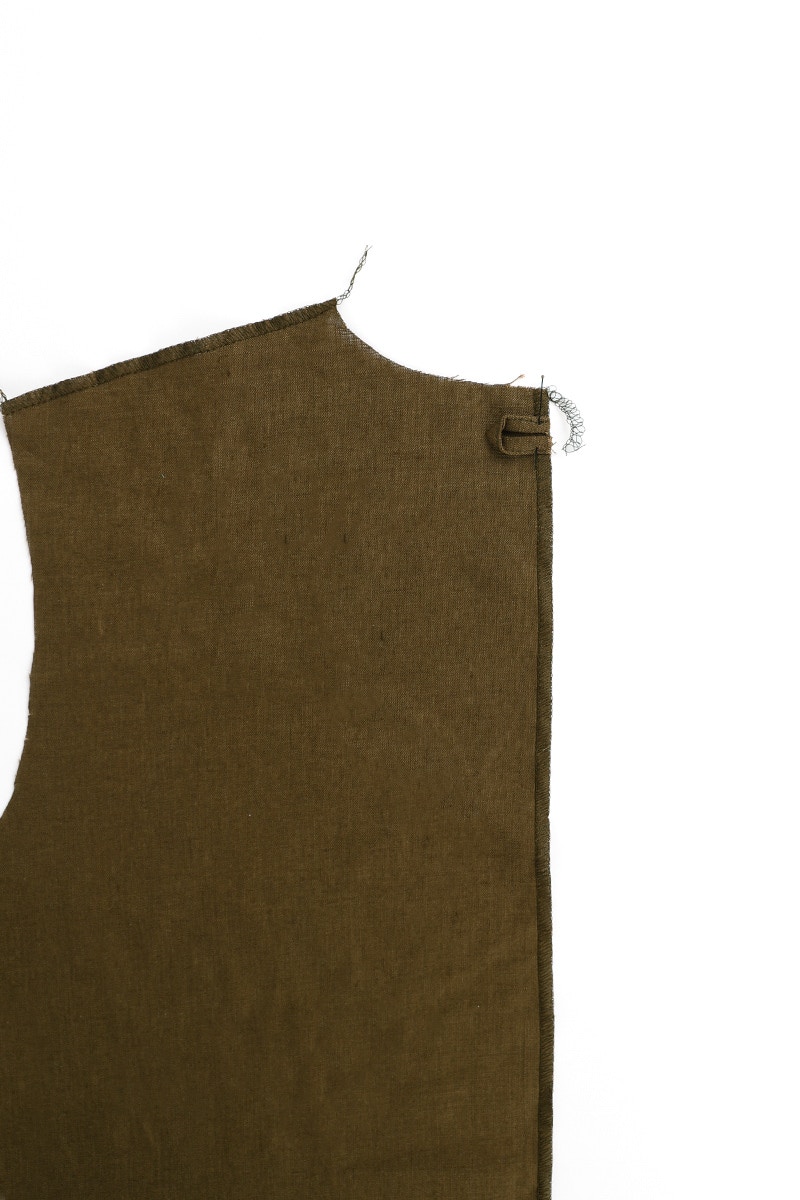
Fold the button loop as shown as per your pressing at the beginning and edge stitch it closed. Now fold the piece to form a loop.
Pin the button loop on the right side of the left back bodice piece at centre back, 1cm down from the neck edge. Align the raw edges with the centre back. Baste in place.
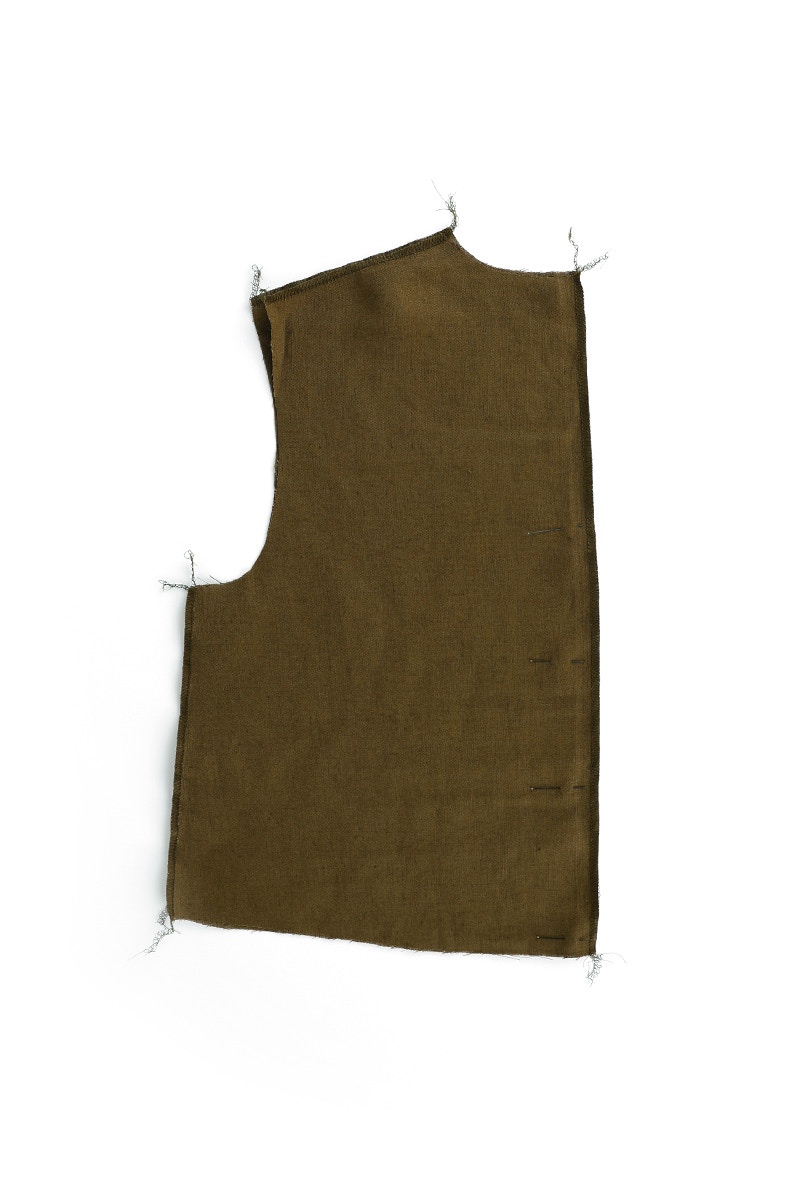
With the right sides together, pin, then sew the two back bodice pieces together at centre back from the notch to the waist edge. Press the seam open.

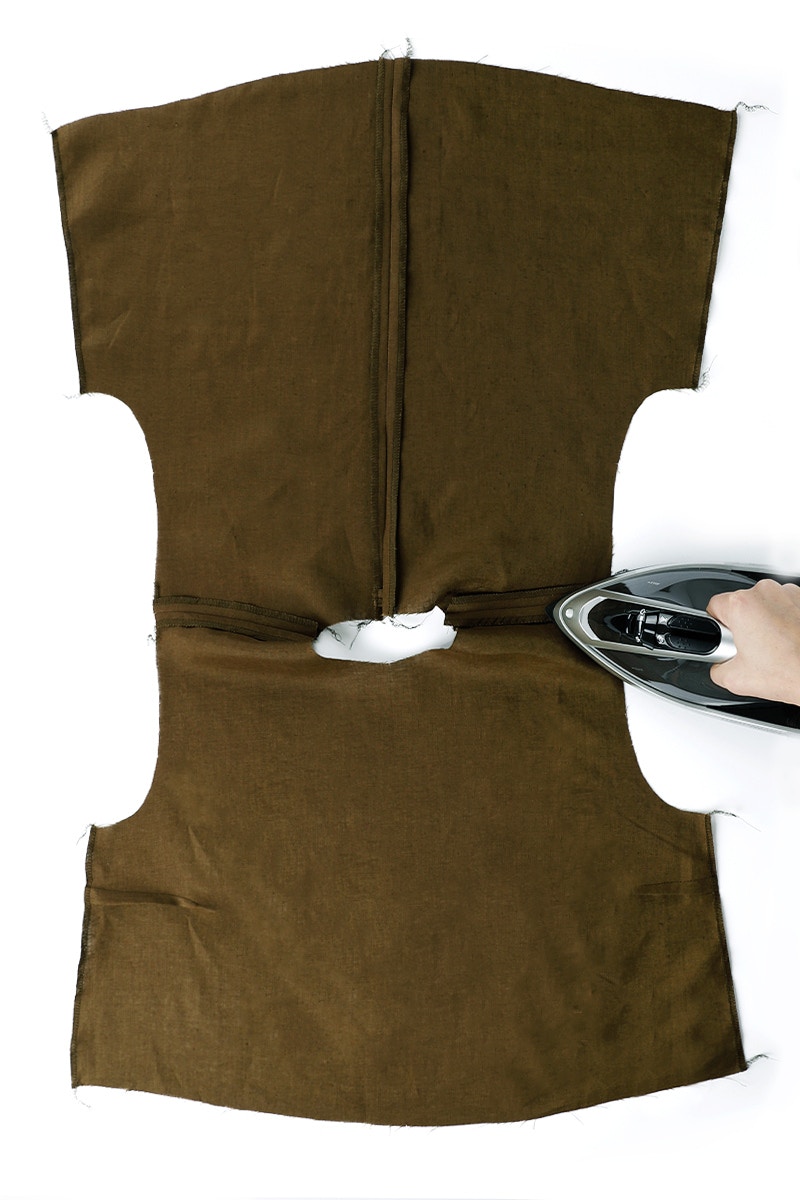
Pin the front shoulder to the back shoulder with the right sides together and sew them with a 1cm seam. Repeat for both shoulders. Press the seams open.

Pin the side seams then sew them together with a 1cm seam. Press the seams open.
3 — Neckline and Collars
In this post, we will go over the three neckline and collar options. Skip ahead to the option you are sewing.


With the right sides together, sew one top collar piece to an under collar piece around the long, curved edge.
Trim the seam to 6mm around the curved edges.


Now, Fold the seam allowance at centre back end towards the under collar. Pin the centre back and then sew the centre back seam, catching the seam allowance as you sew.


Turn the collar right side out and under stitch at centre back for as far as you can comfortably sew, and along the outer collar where the collar will sit over the shoulder. Give it a press, rolling the collar piece slightly towards under collar as you go.

Repeat for the other side to make a pair of collars.

Pin and then baste the collar to the neck edge, with under collar facing the right side of the bodice. The centre back of the collar will align with the notch at centre back on the bodice.
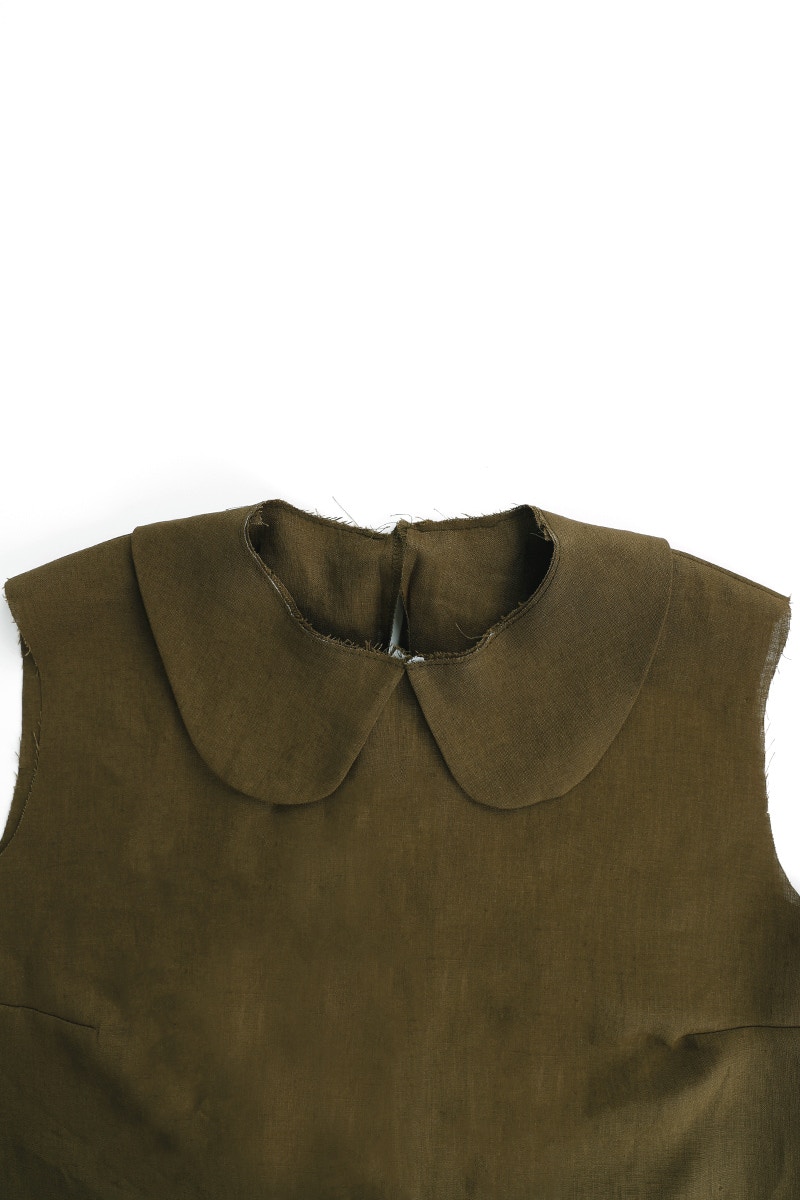
The two collar pieces will meet at the centre front notch. Sew the collar pieces to the bodice, just inside the seam allowance.
Now continue on to sew the neck facing.


Start following along here if you are sewing the round neck option. The Peter Pan collar is shown in some photos, but the process is exactly the same!
We first need to the centre back seam on the neck facing. Fold the facing in half with the right sides together and from the notch to the lower edge. Now, then press the seam open.


Neaten the outer edge of your facing then, with right sides together, pin the neck facing to the bodice at centre back. Sew each centre back edge together with a 1cm seam, starting at the neck edge and finishing at the notch.

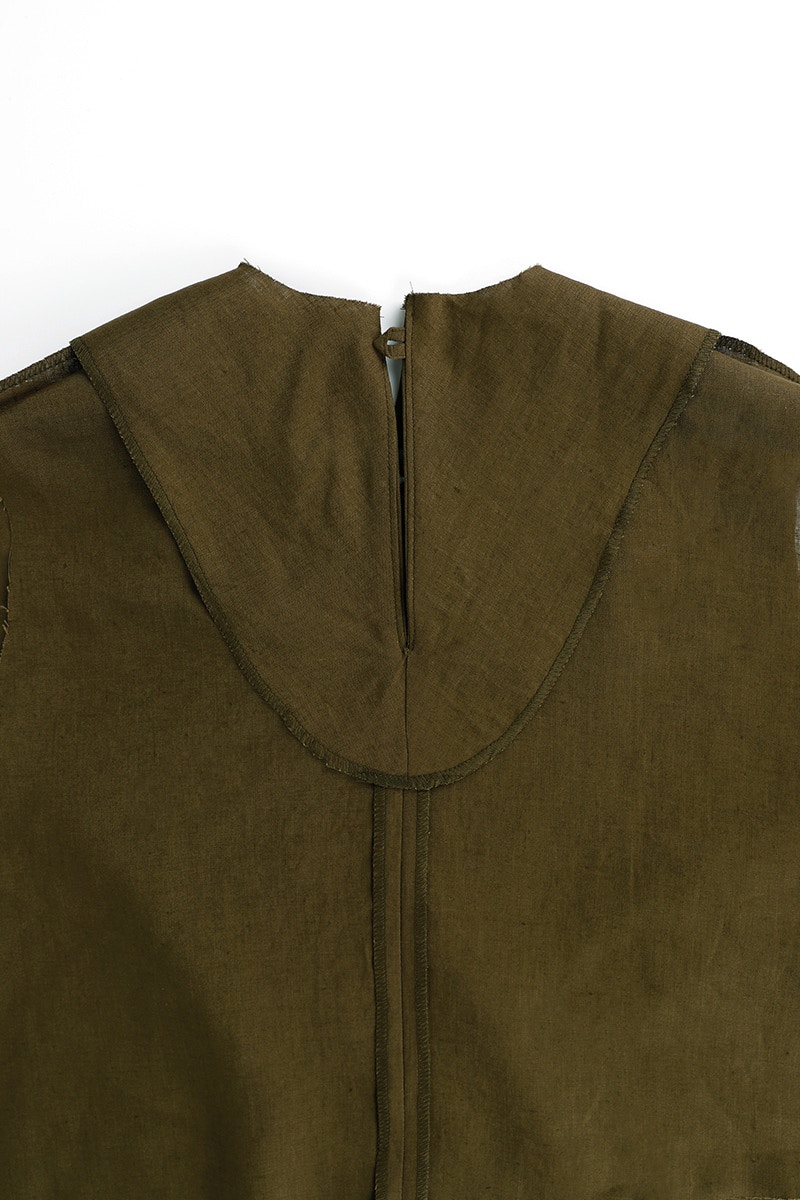
Next, fold the neck facing out and understitch on each side of the centre back opening.
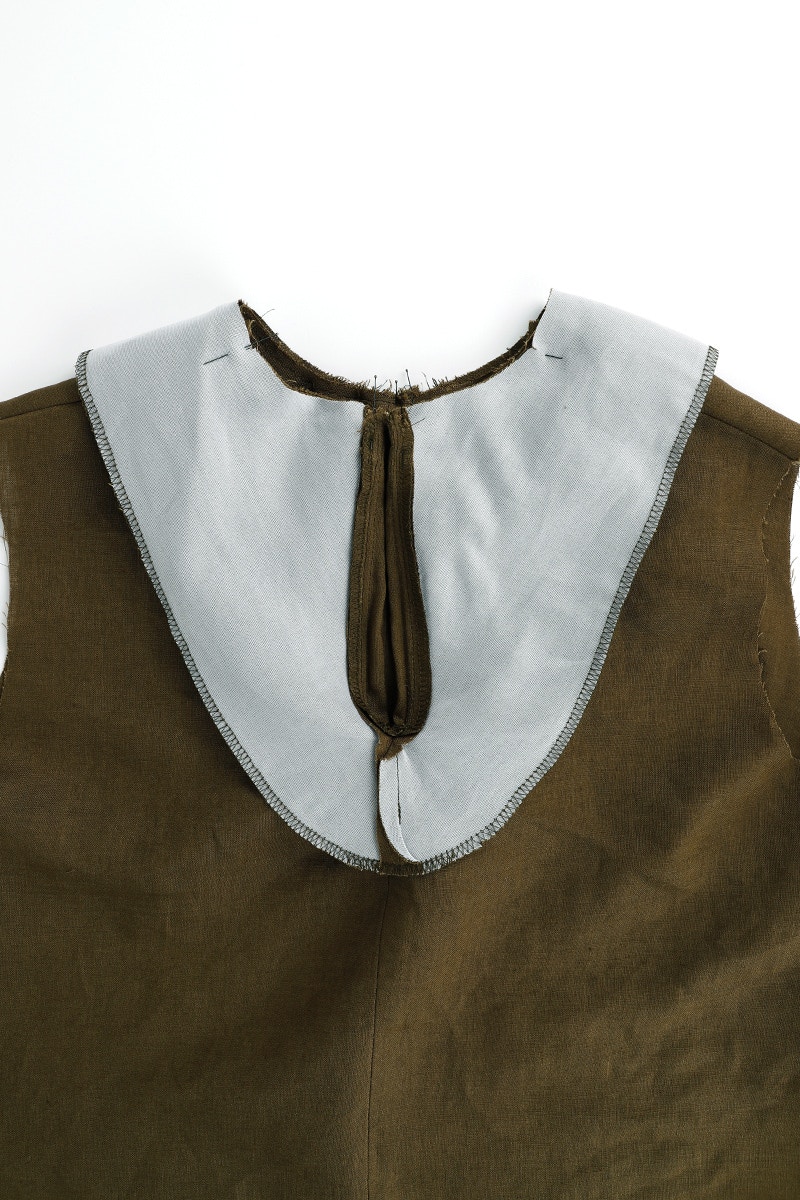
Turn the facing back, so it is right sides together with the bodice again. Fold the seam allowance at the centre back towards the facing and then pin the neck facing to the bodice around the neck edge.
Sew around the neck edge with a 1cm seam.


Clip the neck curve with approximately 1cm spacings. Be careful not to cut through your stitching!
Turn the facing to the wrong using a point turner to help you at the centre back if you need.

Under stitch around the neck edge on the facing. You won’t be able to under stitch right to centre back, just sew as close as you can. Give your neckline a press.
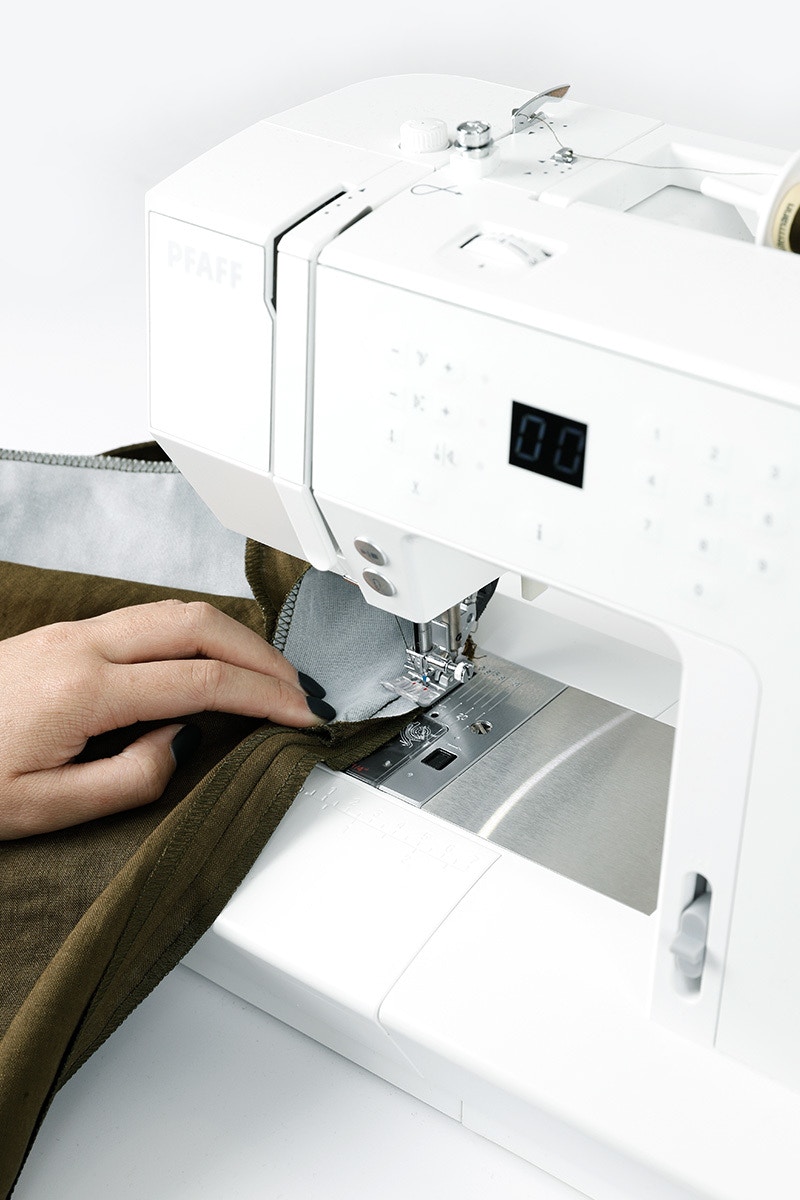
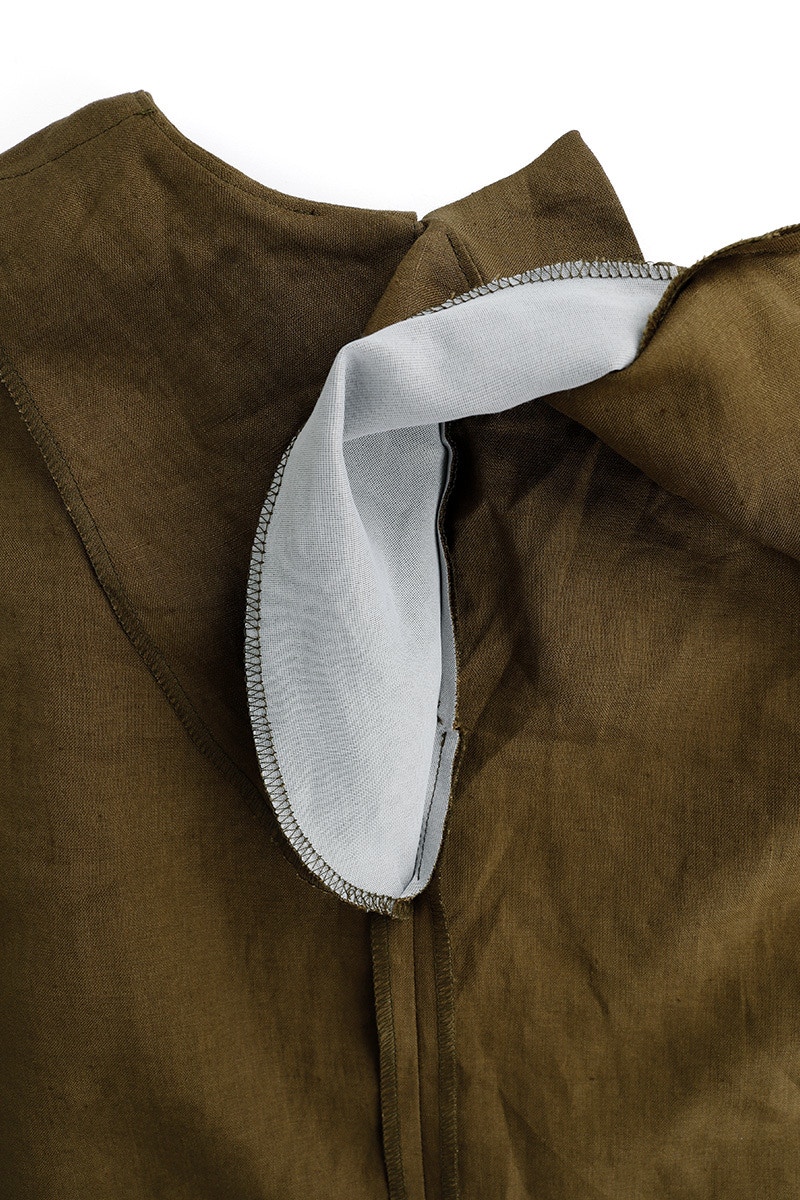
At the centre back, fold back the neck facing and sew the facing seam allowance to the bodice seam allowance to secure it. Be careful not to catch your bodice when sewing.

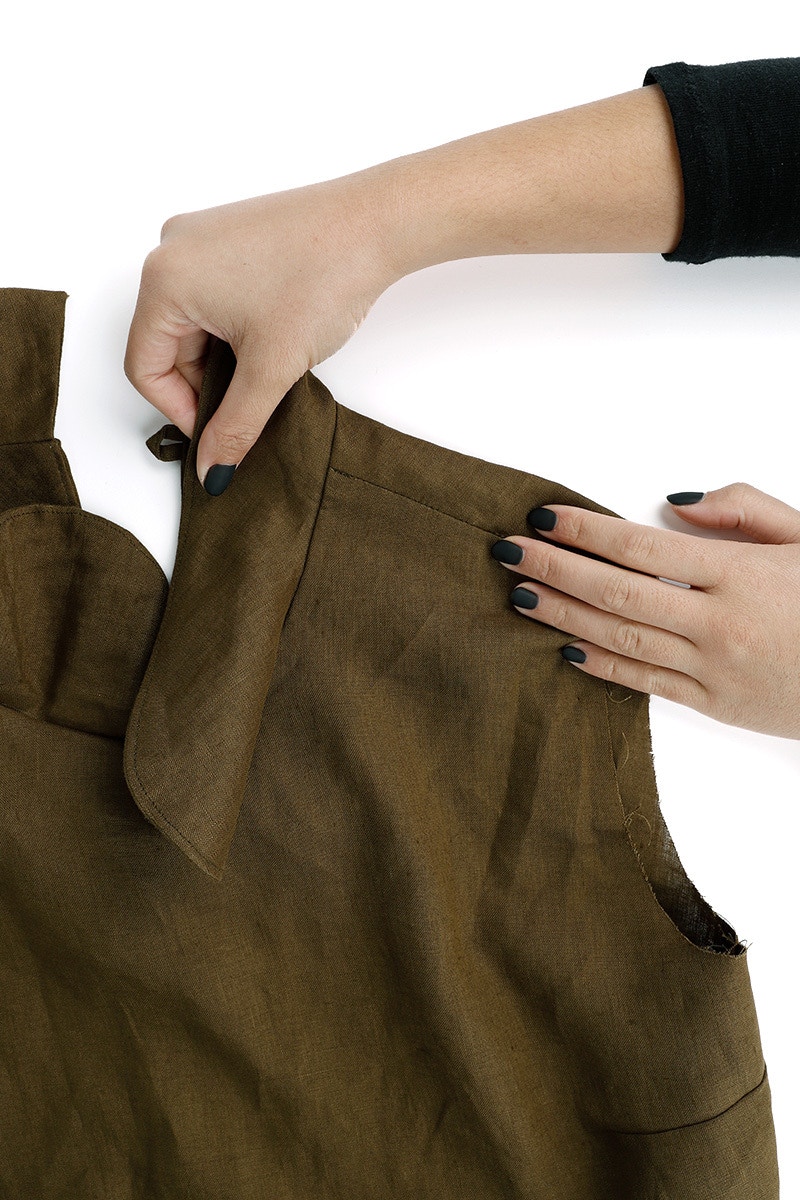
Ditch stitch at each shoulder seam to secure the neck facing to the bodice. If you are sewing the Peter Pan collar, take care not to catch your collar securing the facing.
Next move to sewing the sleeve placket if you are sewing a long sleeved option, or move on to this post if you are sewing your Ivy sleeveless or with short sleeves!
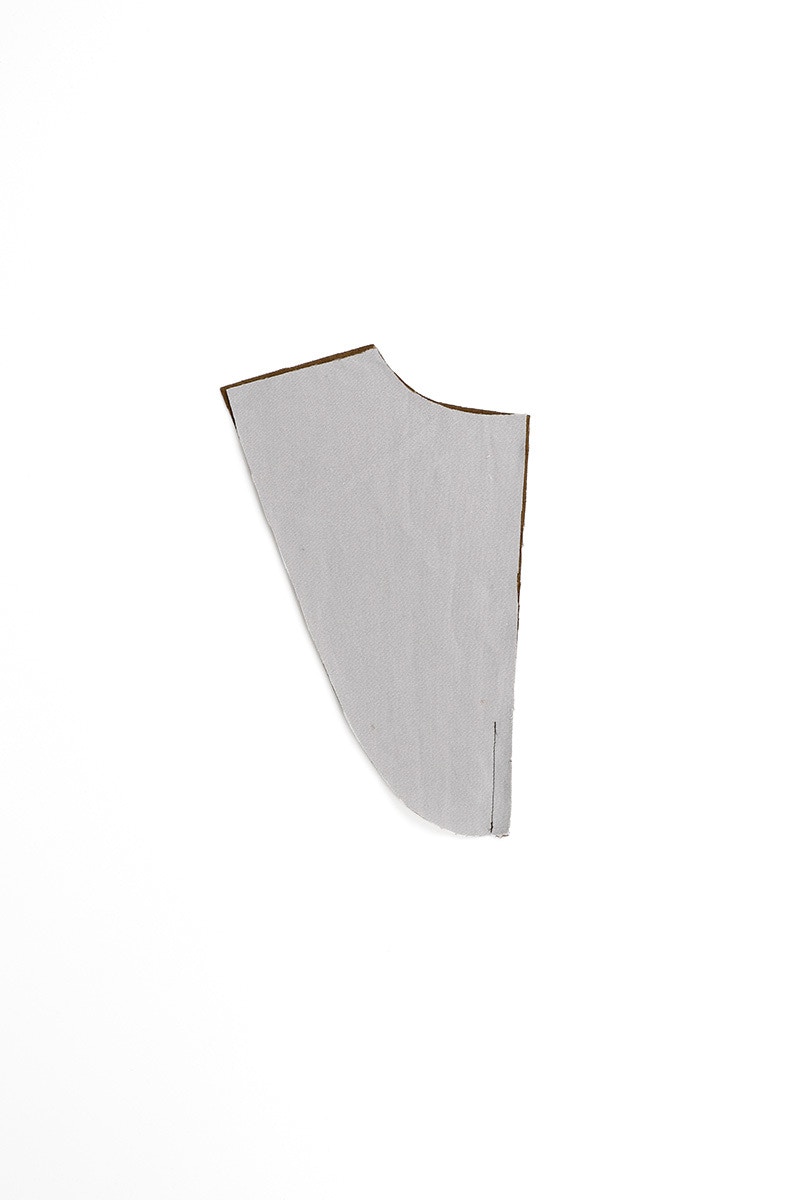
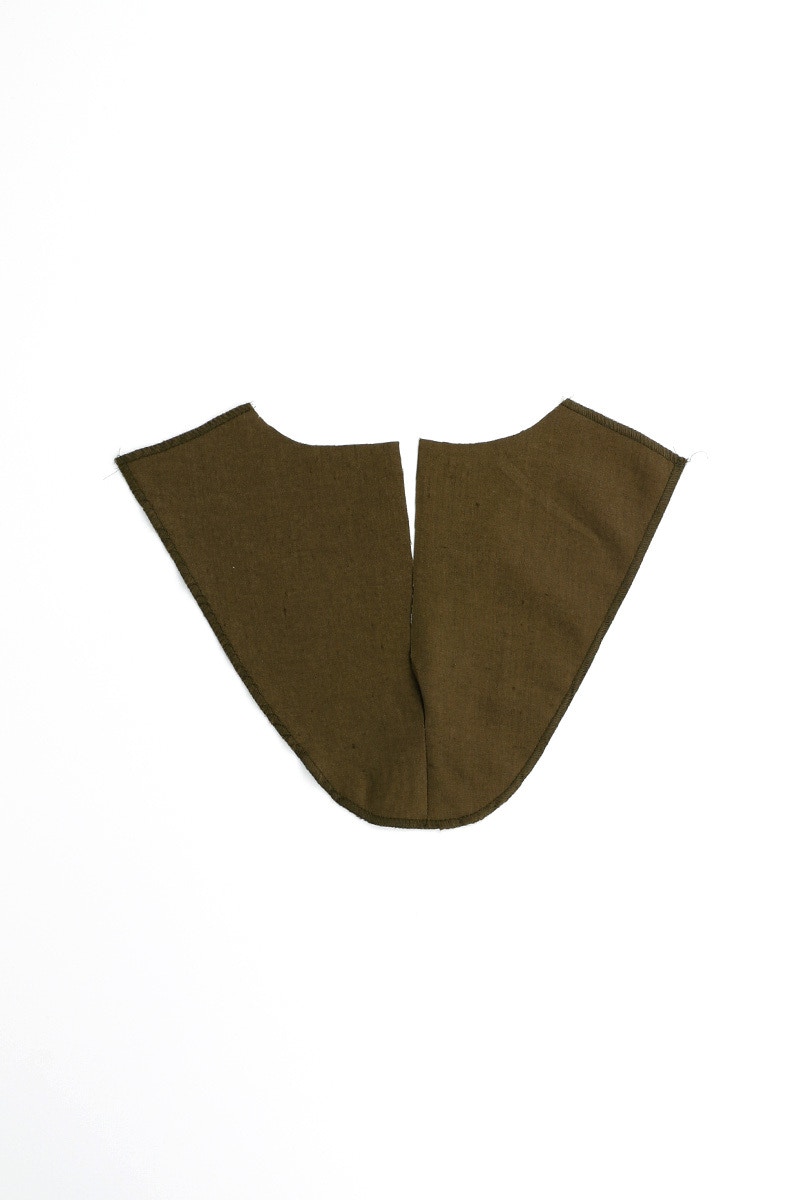
If you are sewing the Tie Back Collar, start following along here!
With the right sides together, stitch the back neck facing at centre back from the notch to the lower edge. Press the seam open, then neaten the long out edge and shoulder.


With right sides together, pin the centre back neck facing to back bodice. Now sew the edges together.
Next, turn the facing right side out, then under stitch each edge at the centre back opening.
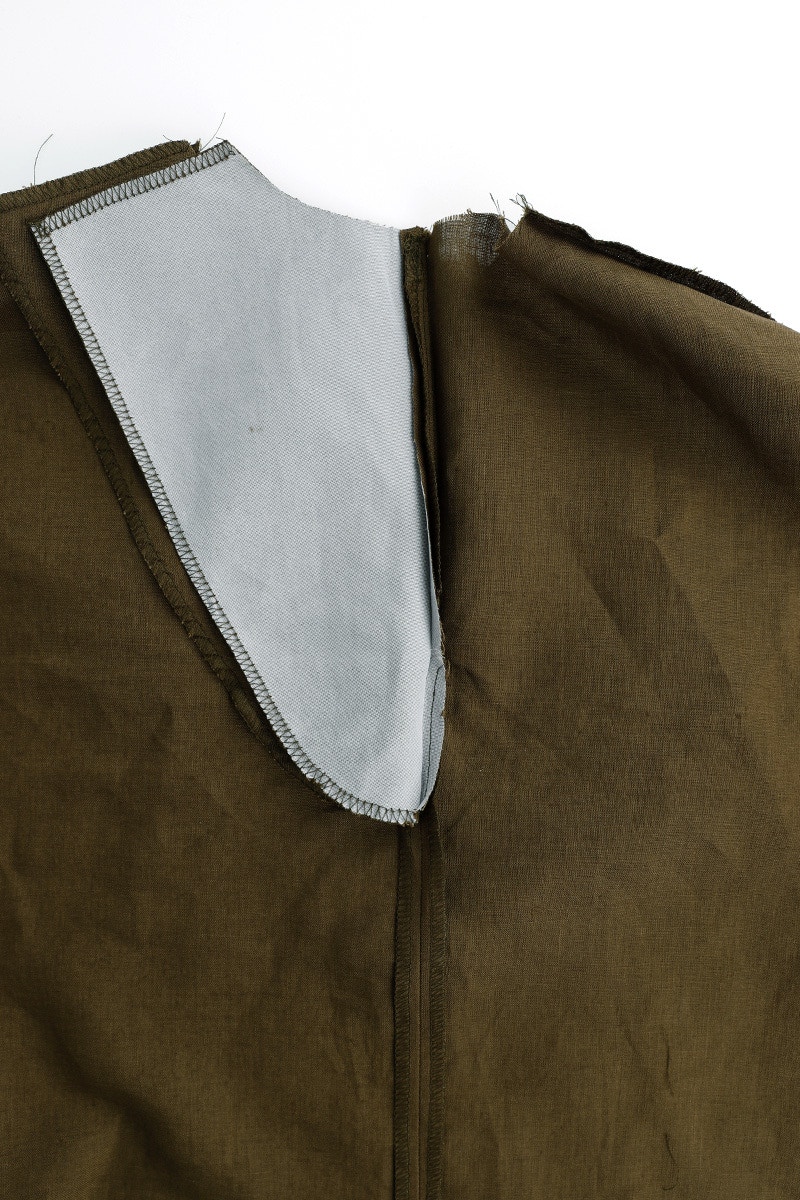
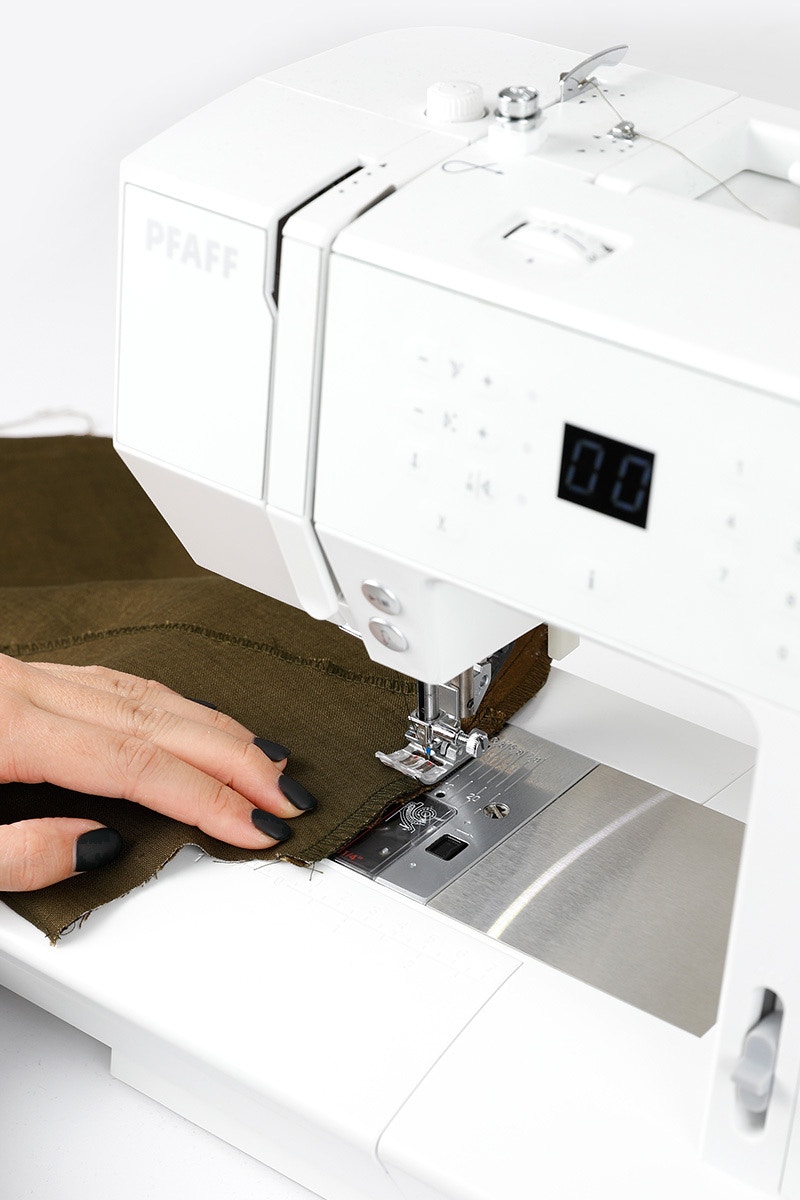
At the centre back, fold back the neck facing and sew the facing seam allowance to the bodice seam allowance to secure it.
Stitch the back neck facing to the front bodice shoulder seam allowance and then baste the facing to the bodice at the back neckline.
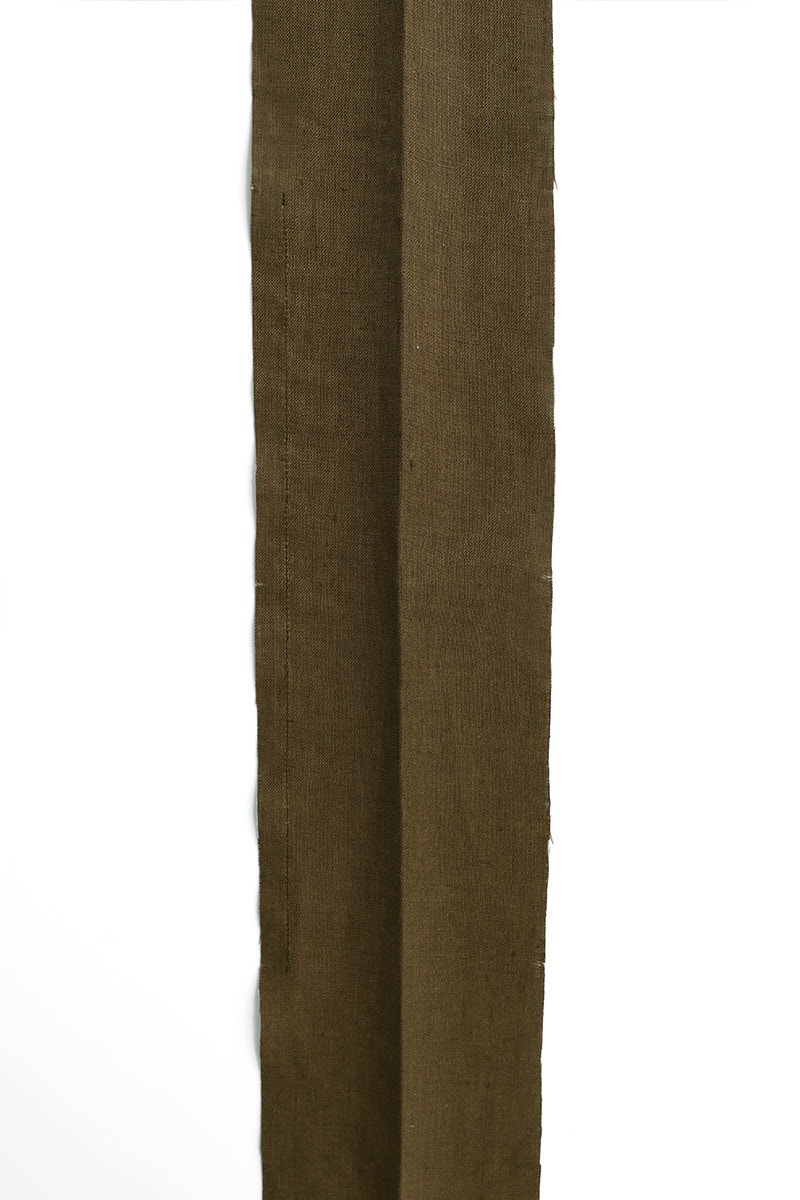
Sew a line stitching at 1cm between the notches, on one side only. This stitching is a guide for folding under the seam allowance to help ensure a tidy finish when you close up the collar.
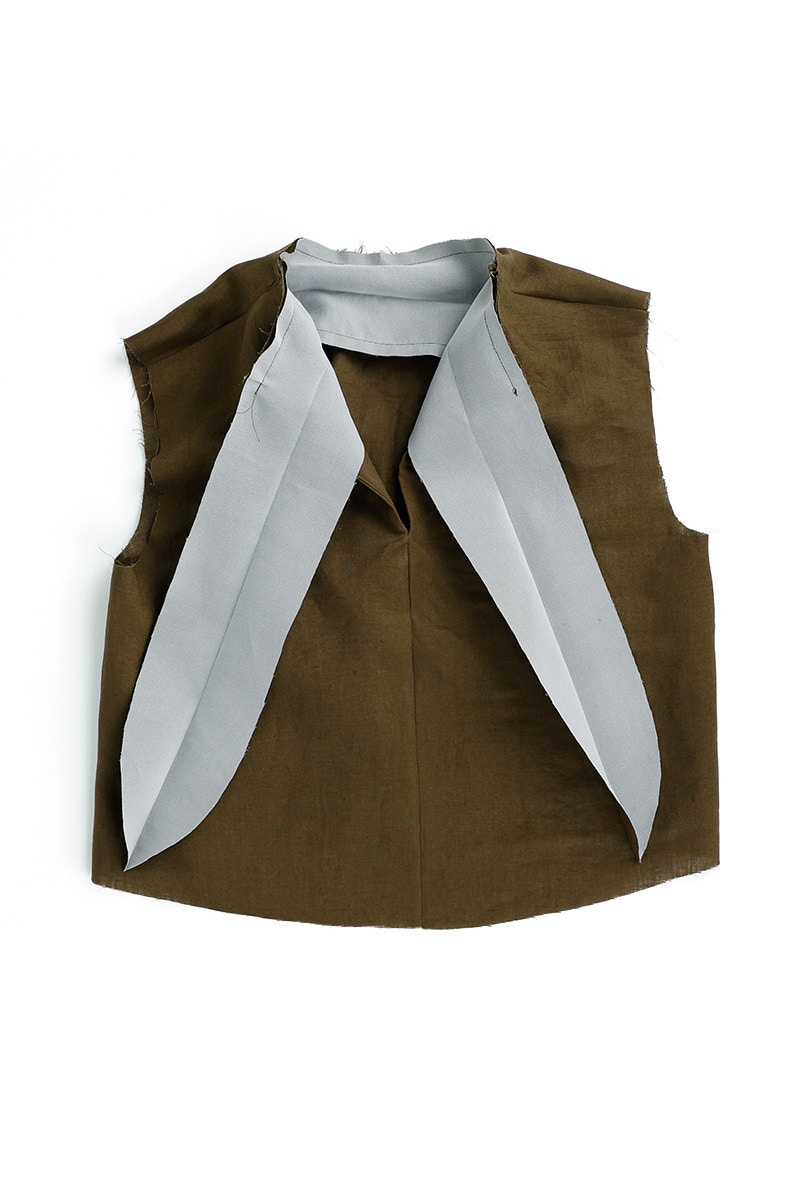
Pin the collar to the bodice on the unstitched side, with the right side of the collar, to the wrong side of the bodice, matching the notches. Sew at 1cm then press the seam towards the collar.

Fold the tie collar in half right sides together and pin. Then, stitch the ends closed. Do the same for both ties.


Trim the curves and turn right side out. Give your ties a press.

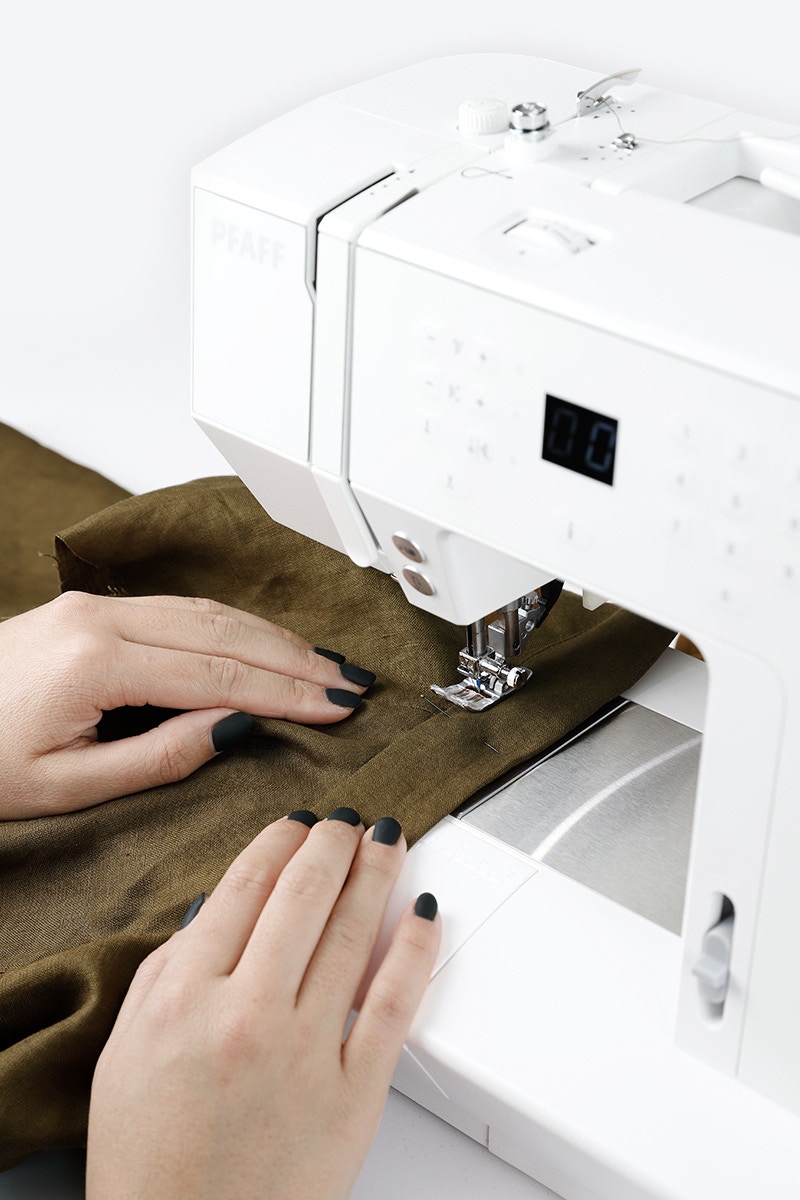
Fold the collar seam allowance under 1cm, using the line of stitching to guide you and pin it in place. Now, edge stitch the collar closed.


Your collar is complete!
Now move to Sewing the Sleeve Plackett, or Sleeveless and Short Sleeve, depending on the view you are sewing!
4 — Sewing the Sleeve Placket
In this post, we sew the sleeves, including the sleeve placket.
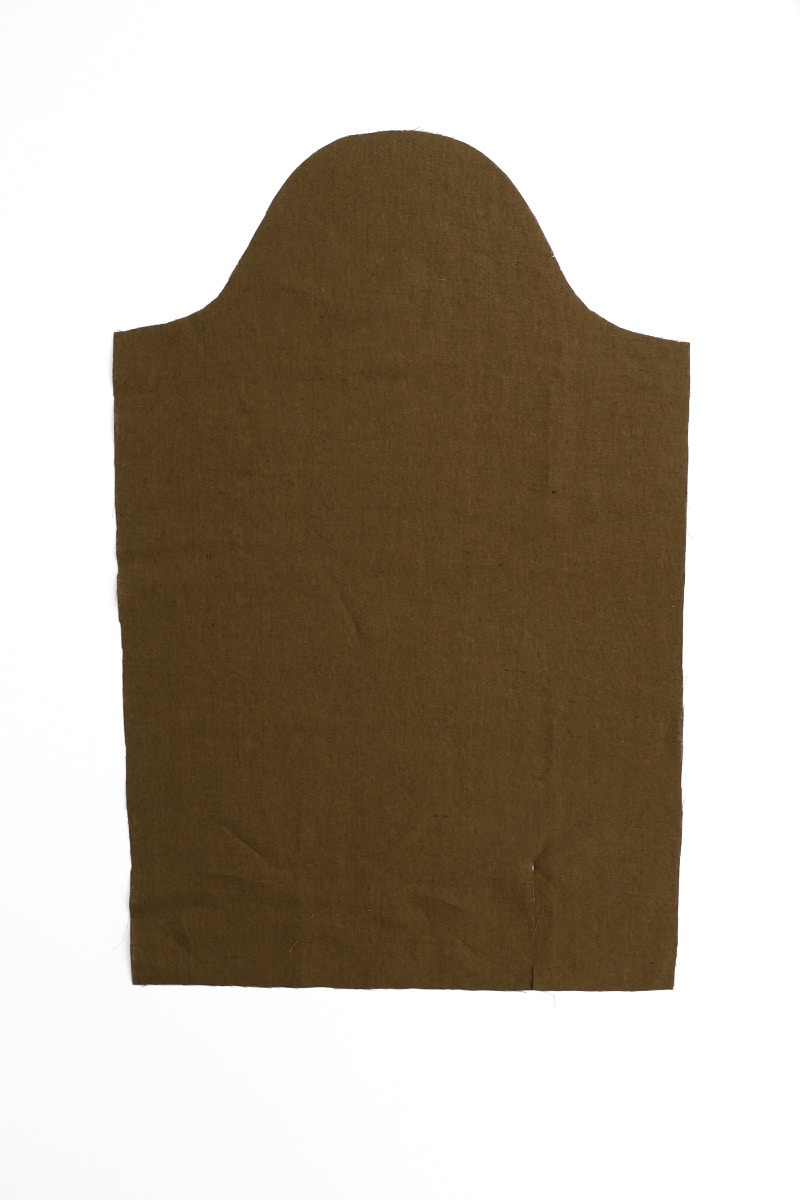
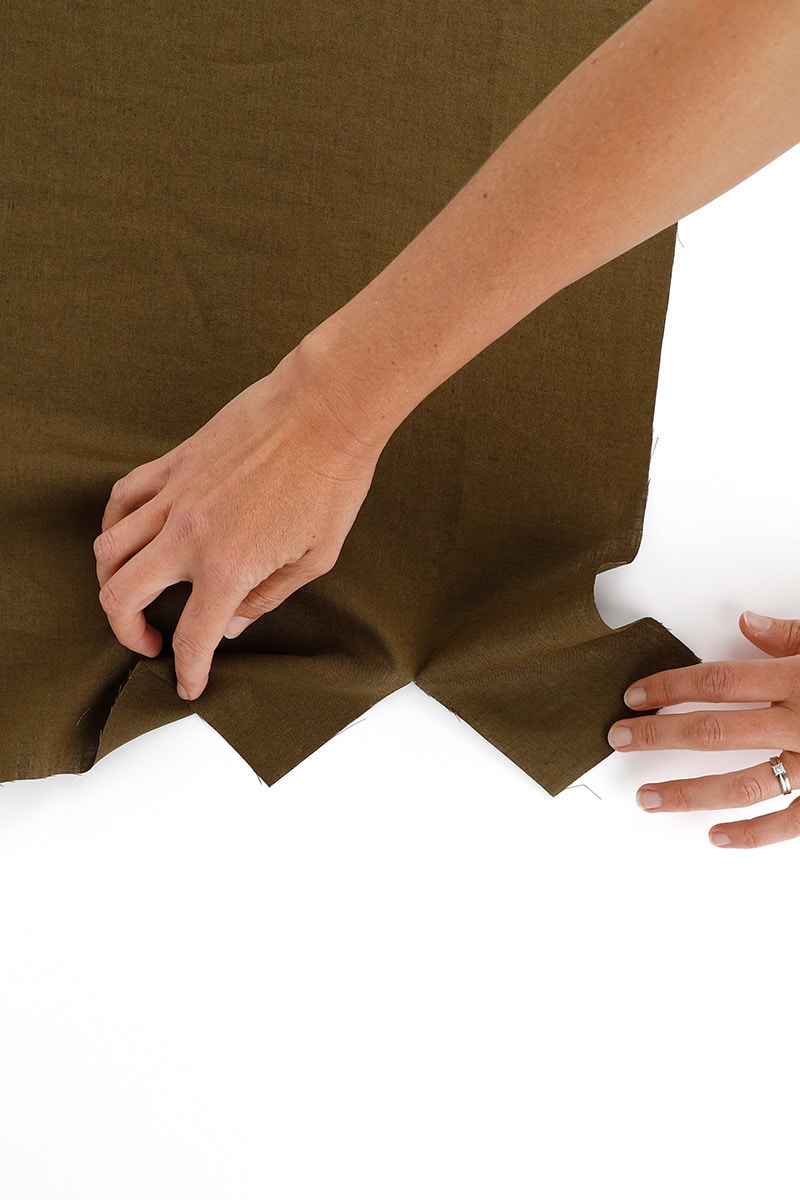
We will start by sewing the sleeve placket binding. Using a ruler and tailor’s chalk or a fabric pen, mark your slash line from the notch at the wrist to the X mark
Cut up the slash line to the X mark. Be careful not cut past the centre of the X or your opening will be too long for the sleeve placket binding.
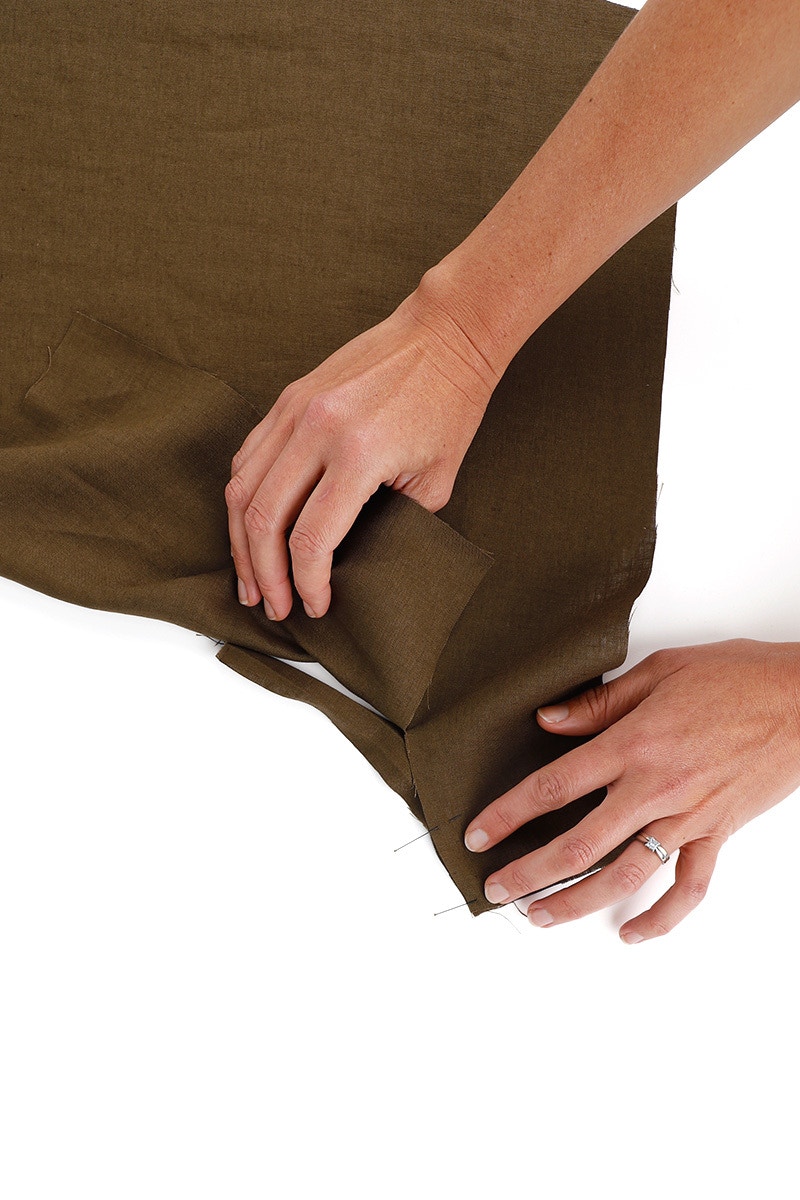

Lay the sleeve placket binding right side up, then place the sleeve on top, also right side up. The cut edge of the sleeve split aligns with the long edge of the sleeve placket binding at each end.

The top of the split is set back 8mm from the binding edge. Pin your sleeve placket in place.


Sew a seam 1cm from the edge of the sleeve placket binding, until you reach the top of the split. The seam allowance on the sleeve starts at 1cm, and reduces to 2mm at the top of the split. Stop with your needle down at the top of the split, adjust your fabric, and then continue sewing to the other end.
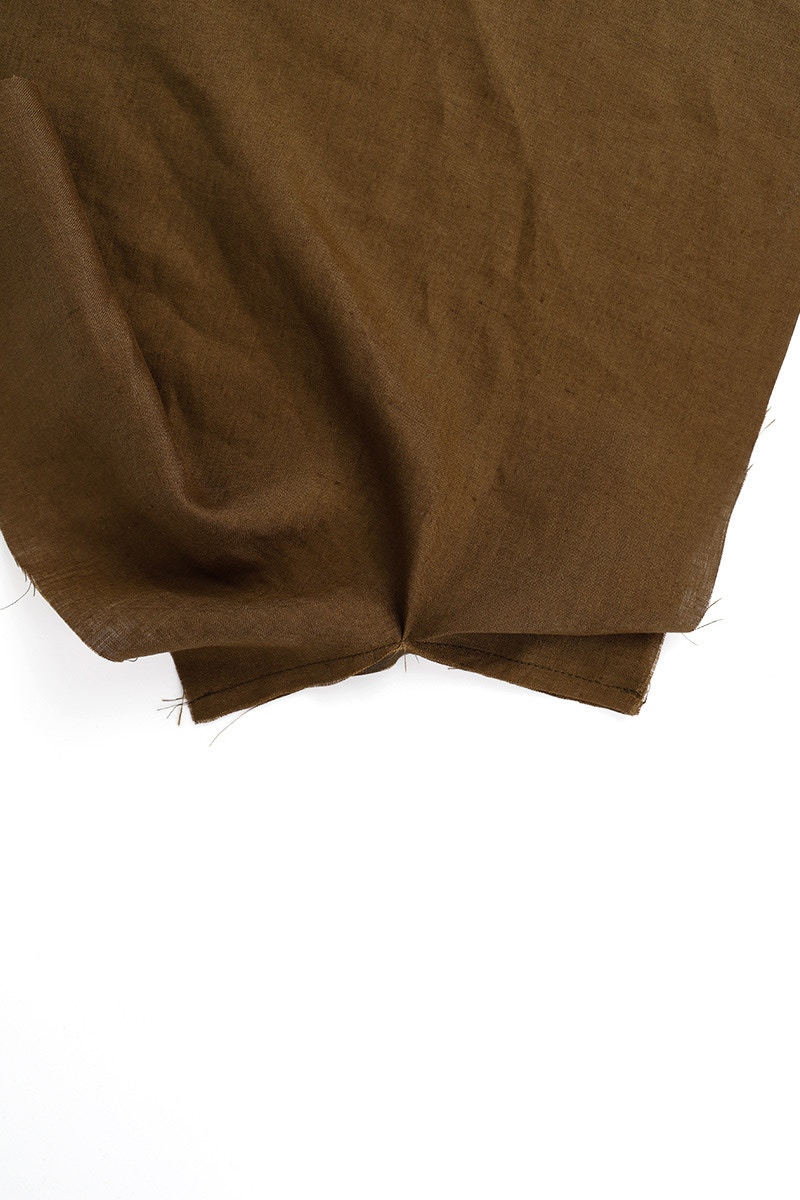
This is how your placket will look once it is sewn.
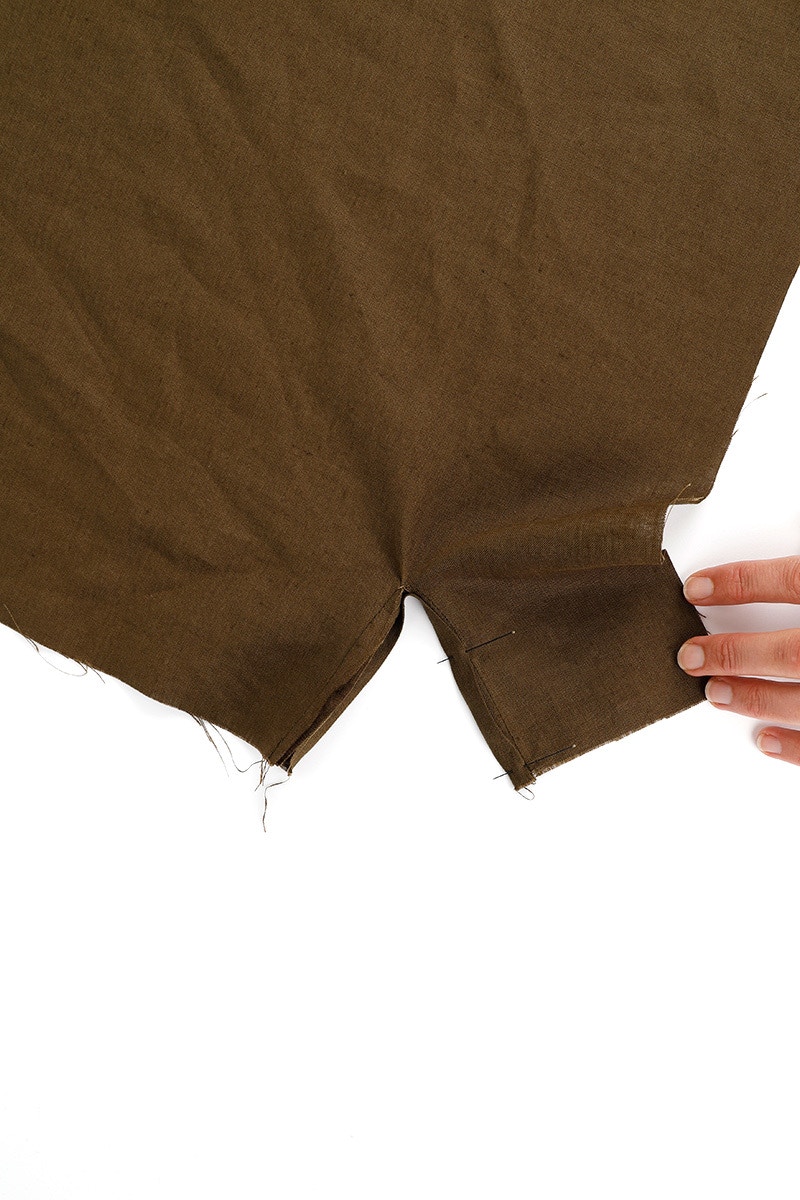
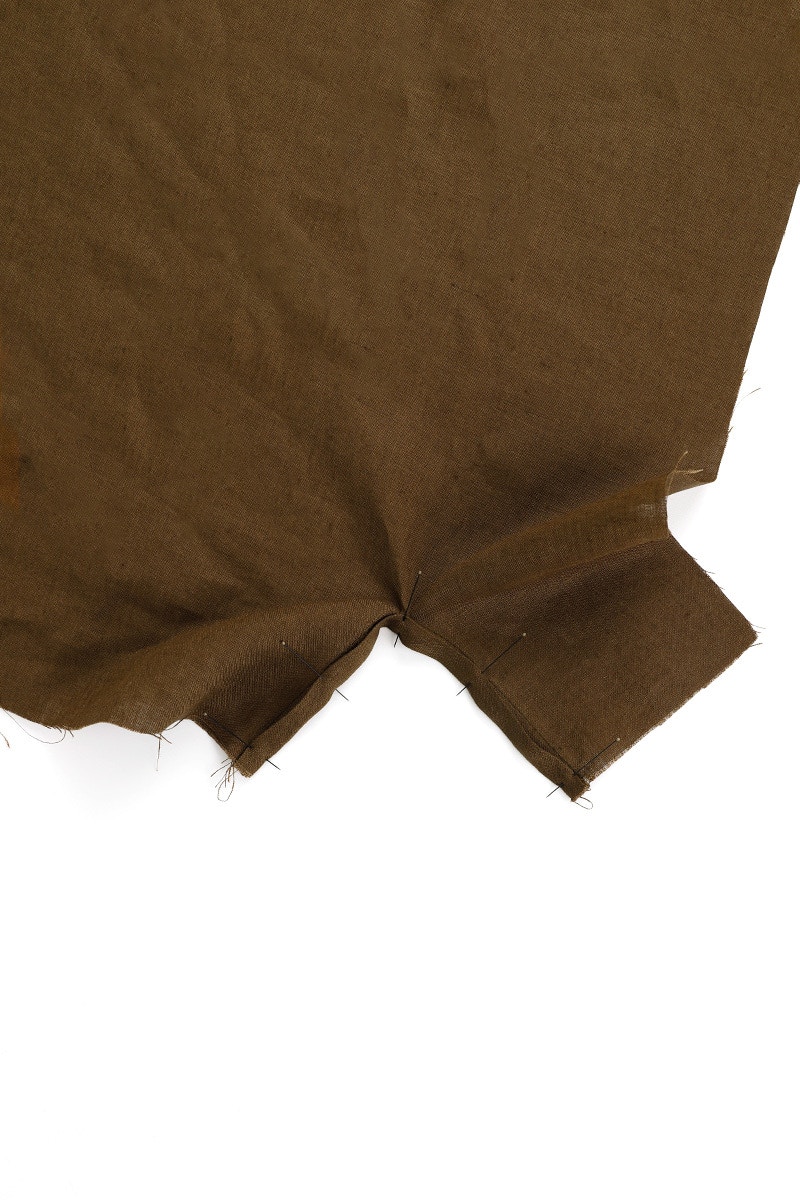
Fold the binding to enclose the raw edge, tucking the 1cm seam allowance of the placket binding under. Pin it in place.

Edge stitch the placket binding closed from the right side.
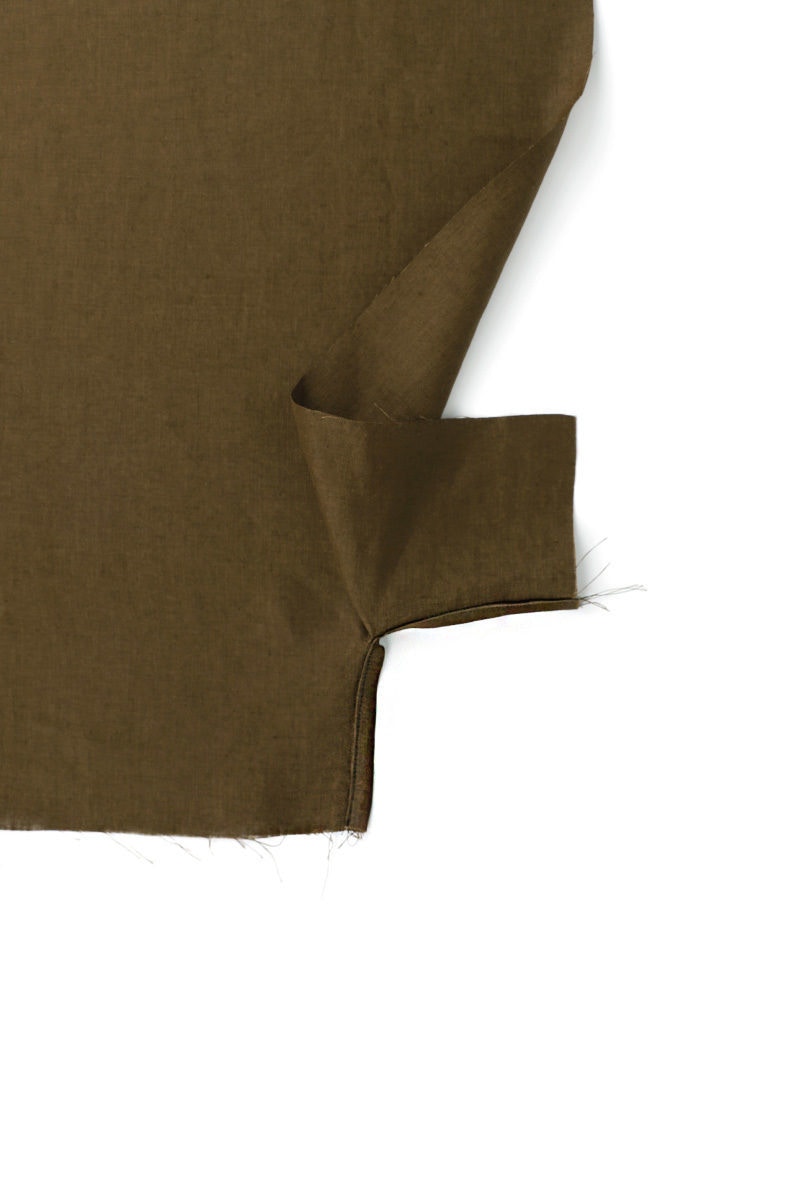
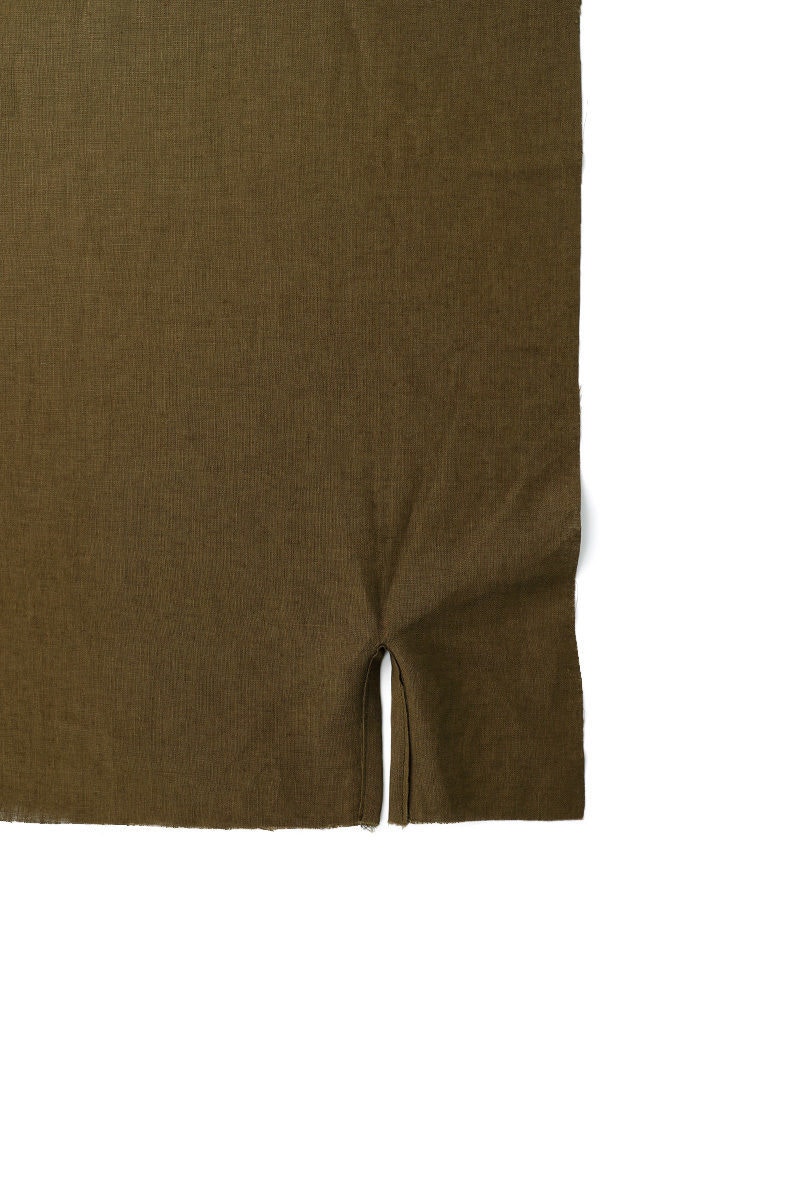
Your sleeve placket binding will now look like this.

Fold the binding in half with the right sides of the sleeve together. Stitch diagonally across the fold in the binding.


Fold the upper binding (the placket binding attached to the wide side of the sleeve) under to the wrong side, then baste in place. Gently give your sleeve placket binding a press.

Repeat for the other sleeve so you have a pair of sleeves!
5 — Cuffs and Attaching the Sleeves

Sew a line of stitching at 1cm between the notches as shown below. This stitching is a guide for folding under the seam allowance to help ensure a tidy finish when you close up the cuff. The side with the stitched line will be the outer cuff, and the side without stitching will be the inner cuff.


Fold your cuff in half, lengthways with the right sides together. Sew the buttonhole end of the cuff closed, finishing 1cm before the cuff edge.
At the button tab end of the cuff, sew the end closed at 1cm, this time finishing at the cuff edge.
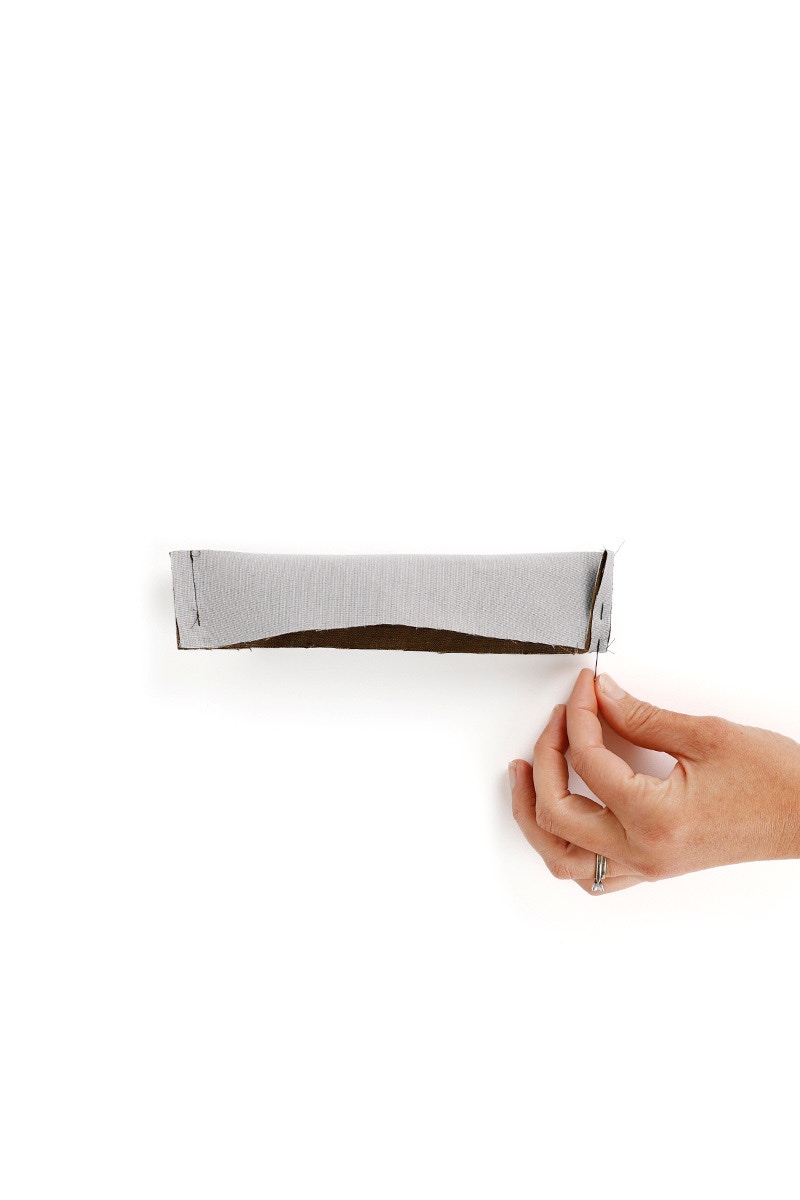

Then fold the seam towards the inner cuff (unstitched side) and stitch from the edge to the notch, catching the seam allowance as you sew.

Clip into the end of the seam, at the notch, 1cm on the inner cuff only.
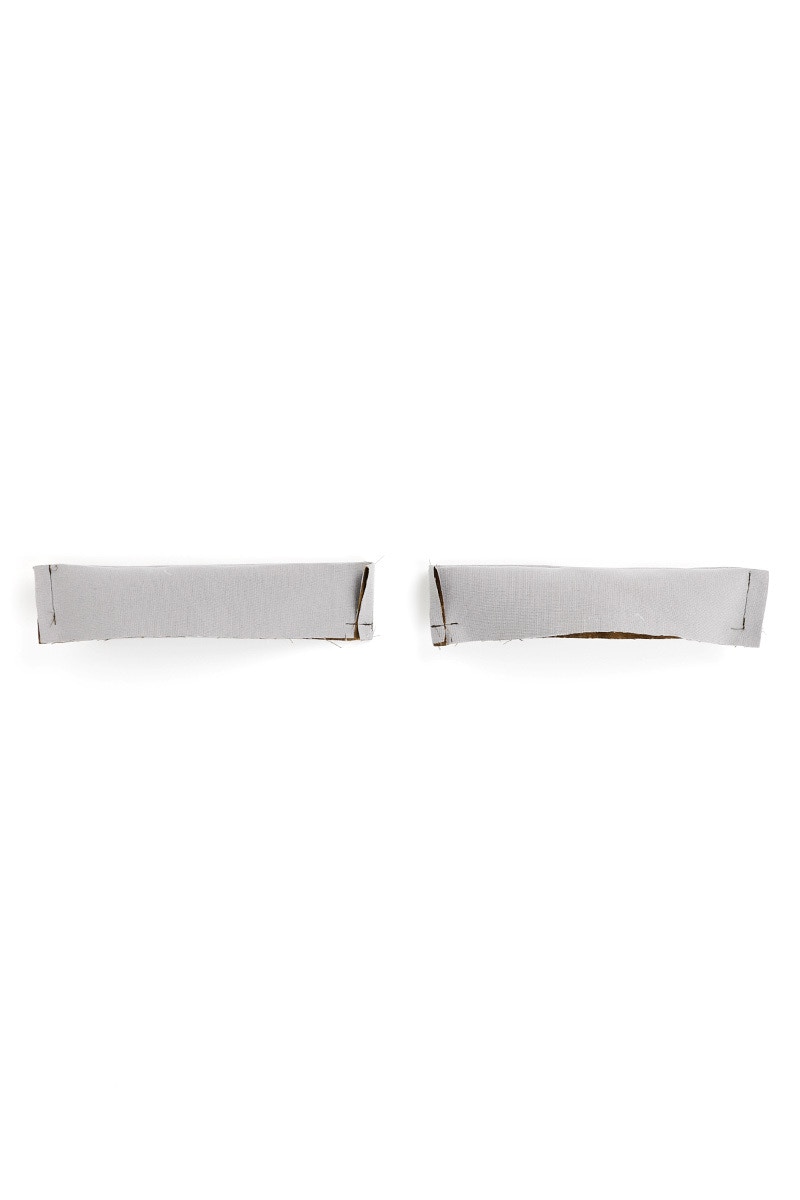
Sew a second cuff as a mirror image of the first cuff, so you create a pair of cuffs.

Now, trim the lower corner on the tab/button end of the cuffs.


Turn your cuffs right side out and give them a press.


We will now attach your cuffs to the sleeves!
Using the longest stitch on your sewing machine, run two parallel lines of stitching 6mm apart, at the cuff edge. Gather the stitching until it is the same width as the cuff opening.

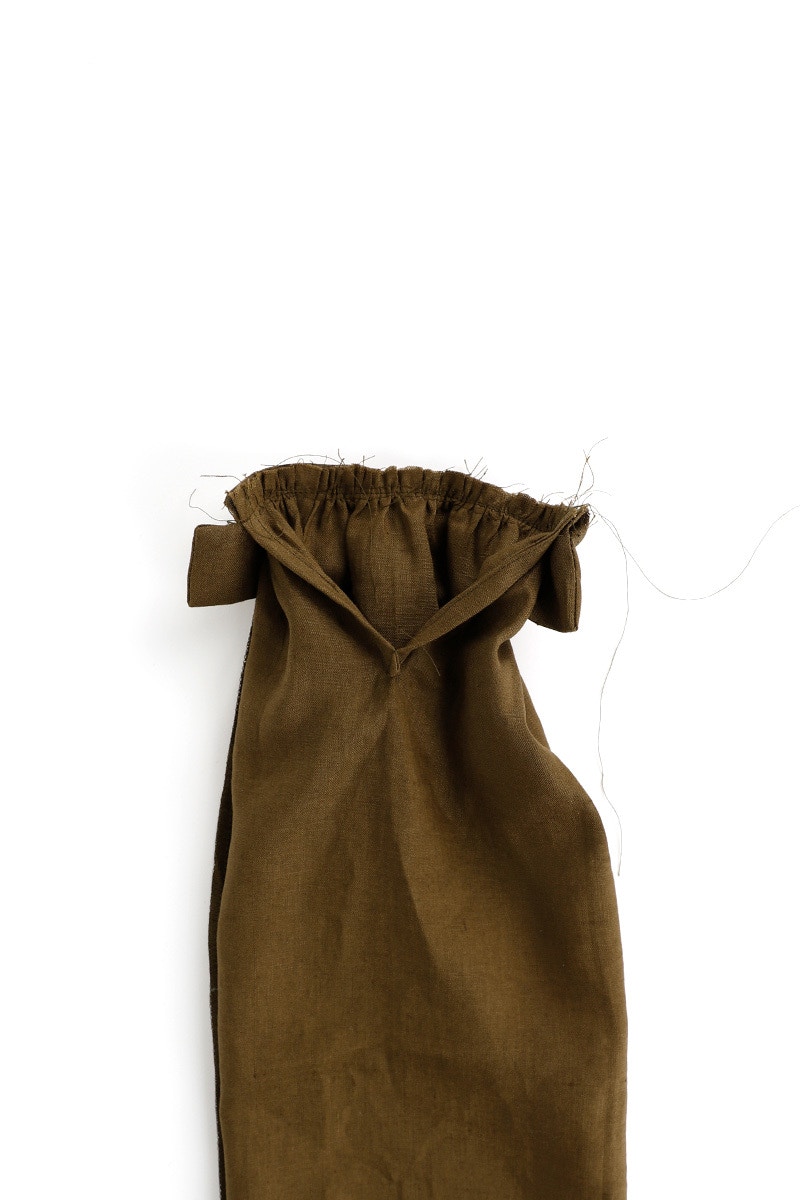
Pin the sleeve to the cuff between the notches, the wrong side of the sleeve to the right side of the inner cuff. This is the unstitched edge of the cuff.
The button tab end will go at the back of the sleeve, and the buttonhole end will be at the front. Now stitch the sleeve and cuff together.
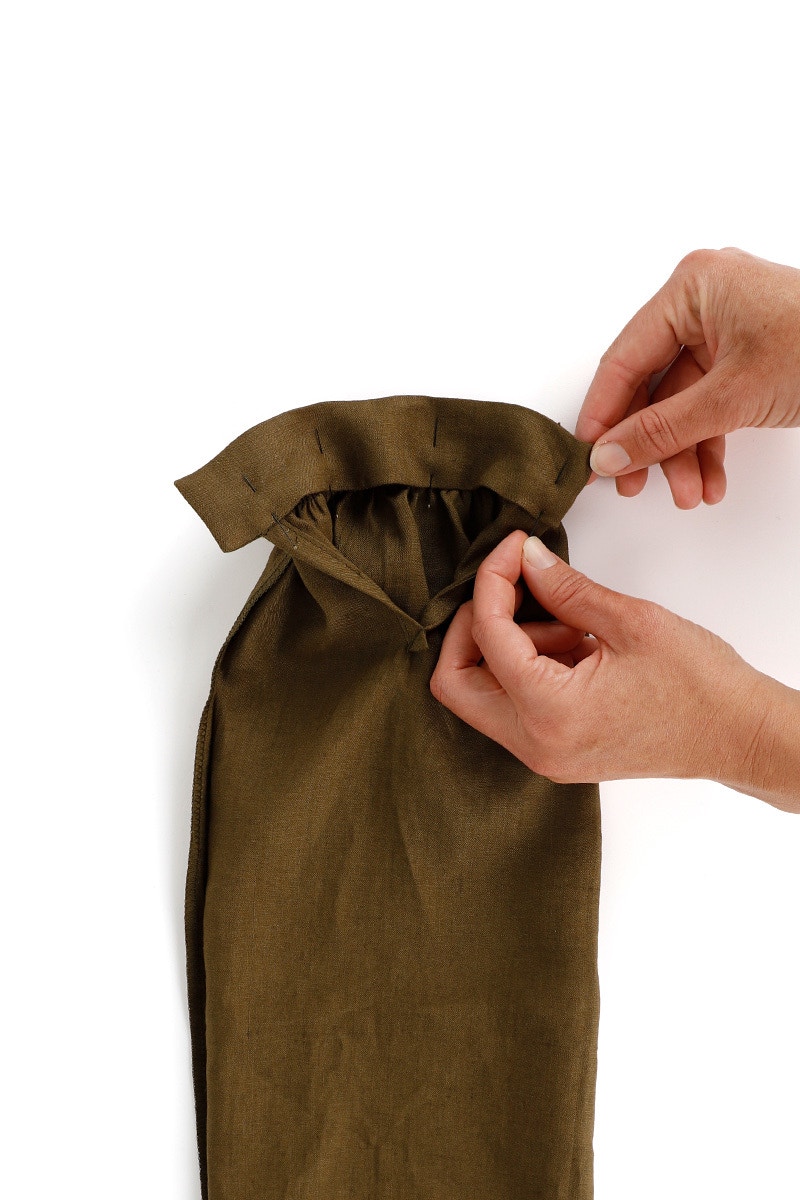

Press the seam into the cuff. Fold the 1cm seam allowance on the outer cuff under, and pin. The line of stitching you sewed will guide you here.
Stitch the cuff closed from the right side, then remove any visible gathering stitches.

Repeat for your other cuff.
Now scroll down to attach the sleeves to the bodice.

On the tie cuff, sew a line of stitching at 1cm from the edge to the notch as shown below. This stitching is a guide for folding under the seam allowance to help ensure a tidy finish when you close up the cuff. The side with the stitched line will be the outer cuff, and the side without stitching will be the inner cuff.

Using the longest stitch on your sewing machine, run two parallel lines of stitching 6mm apart, at the cuff edge. Gather the stitching until it is the same width cuff between the notches.
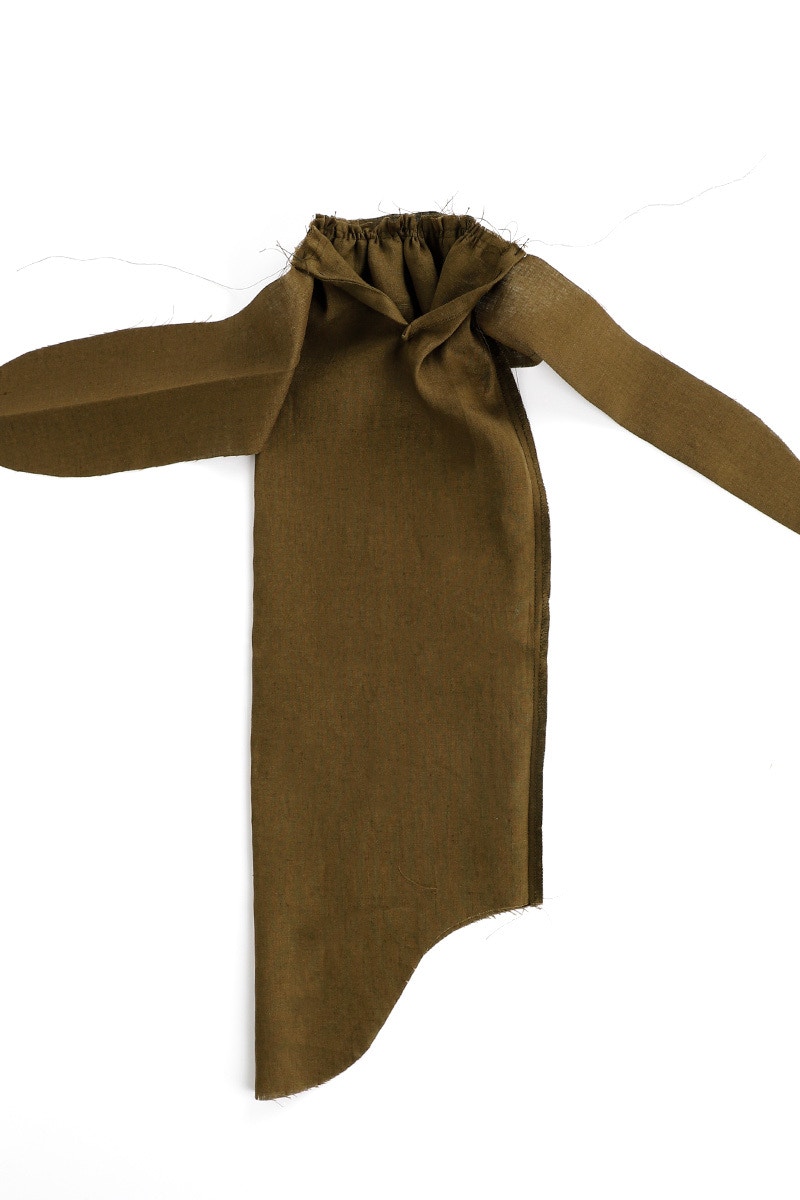
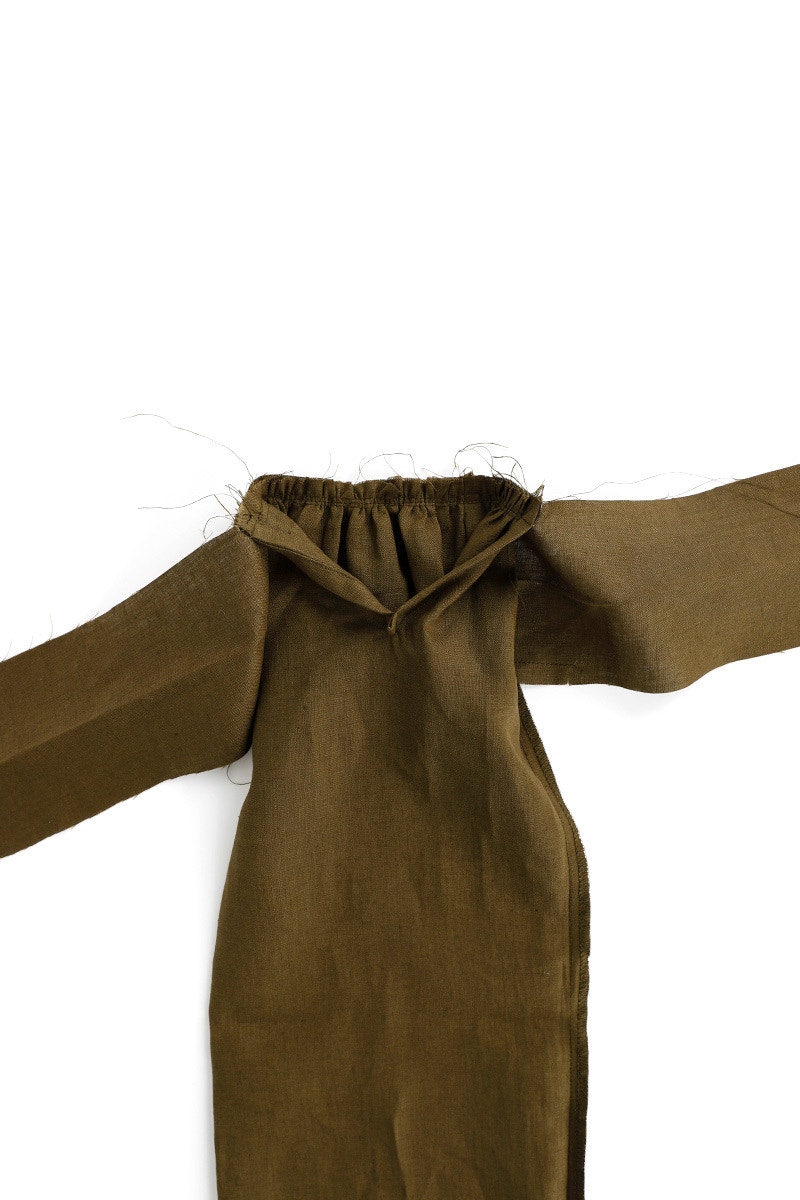
Pin the sleeve to the cuff between the notches, on the inner cuff (unstitched side). Place the wrong side of the sleeve to the right side of the cuff. Now stitch to two pieces together.

Fold the tie cuff in half right sides together and pin.

Stitch the ends closed.

Now, trim the curved ends to 6mm and turn the cuff right side out. Press the seam into the cuff.

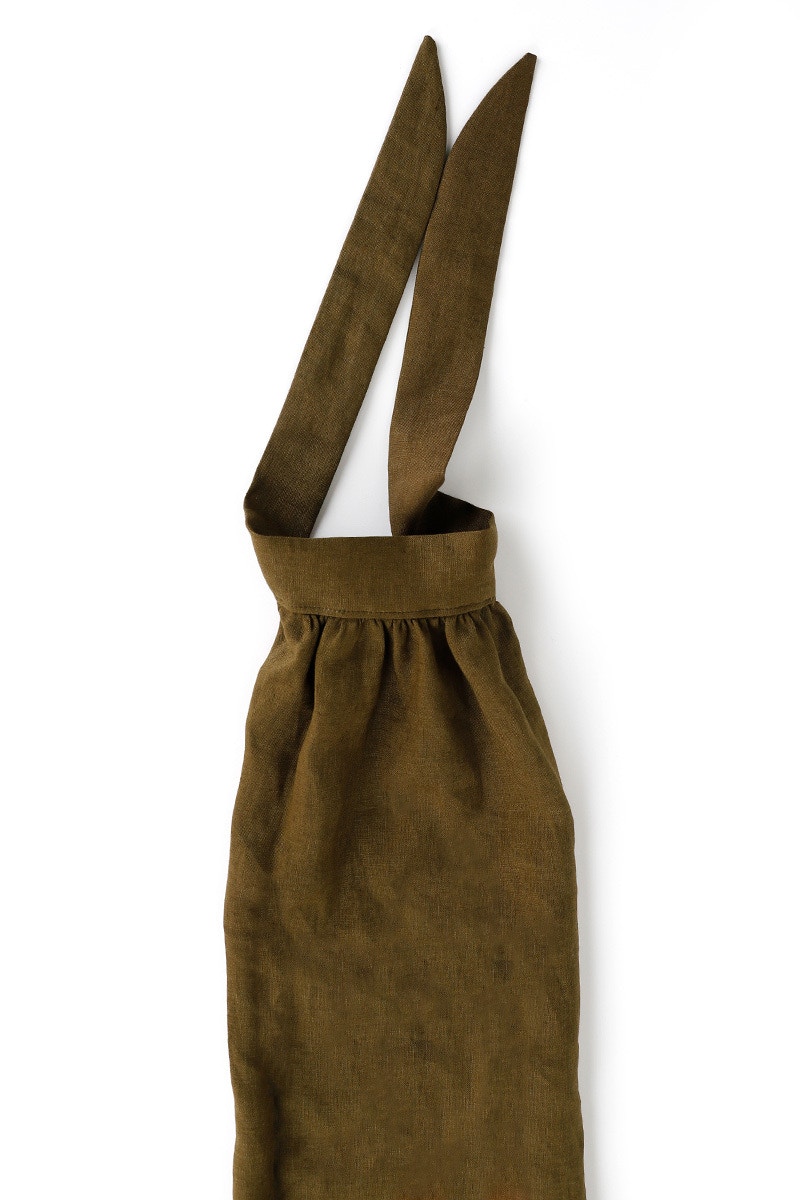
Now, fold under the seam allowance 1cm along the line of stitching and pin. Edge stitch your cuff closed from the right side.

Repeat for the other cuff, then give your sleeves a press.
Follow on to set in your sleeves to the bodice.

We will now set in the sleeves.
Using a long stitch, run a line of basting stitches over the sleeve head, 6mm from the edge, between the notches.


With the right sides together, pin the sleeve to the bodice, matching the underarm seam and the notches. Pull the basting thread gently to ease the sleeve head to the bodice. Pin the sleeve in place.


Sew the sleeve to the bodice, adjusting the sleeve head as you sew, and taking care not to create any tucks.


Neaten the seam and then press it towards the sleeve.

Set in your second sleeve in the same way.
6 — Short Sleeves or Sleeveless

With the right sides together, sew the sleeve seam at 1cm. Neaten your seam and then press it towards the back.
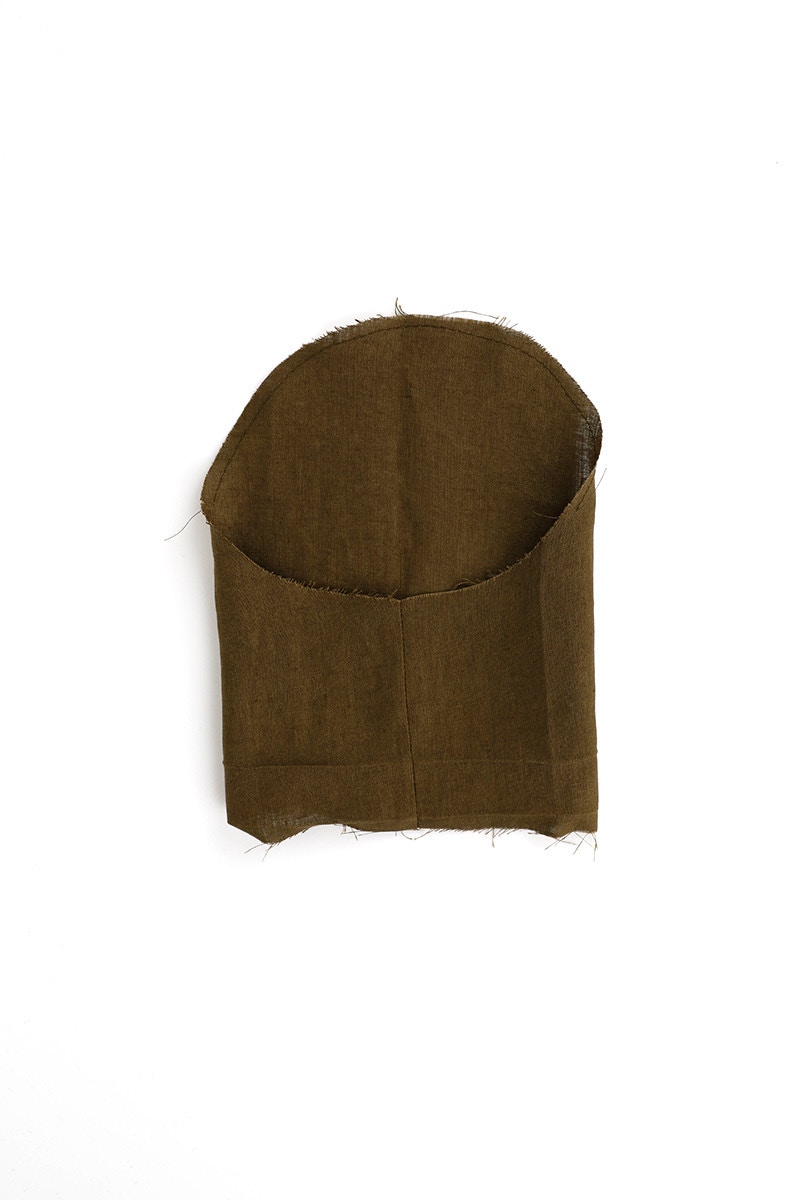
Using a long stitch length, sew a line of ease stitching approximately 6mm from the edge. Sew from notch to notch over the sleeve head.


Pin the sleeve to the bodice, matching the seams and notches. You will need to gently ease the line of ease stitching to get the sleeve head to fit the bodice.
Next, sew the sleeve to the bodice, adjusting your fabric as you sew to make sure you don't get any tucks in the sleeve head. Neaten the seam and then press it towards the sleeve.

To complete your short sleeve, fold the back the sleeve hem allowance 1cm, then fold the hem up a further 3cm. Pin it in place, then edge stitch the hem closed.
Give your sleeve a press then repeat for the other side!


With right sides together, stitch the front armhole facing to the back armhole facing at the shoulder and underarm.
Press the seams open, then neaten the outer edge with your overlocker.


Pin the facing to the bodice with the right sides together, matching the notches, sew the armhole facing to the bodice.
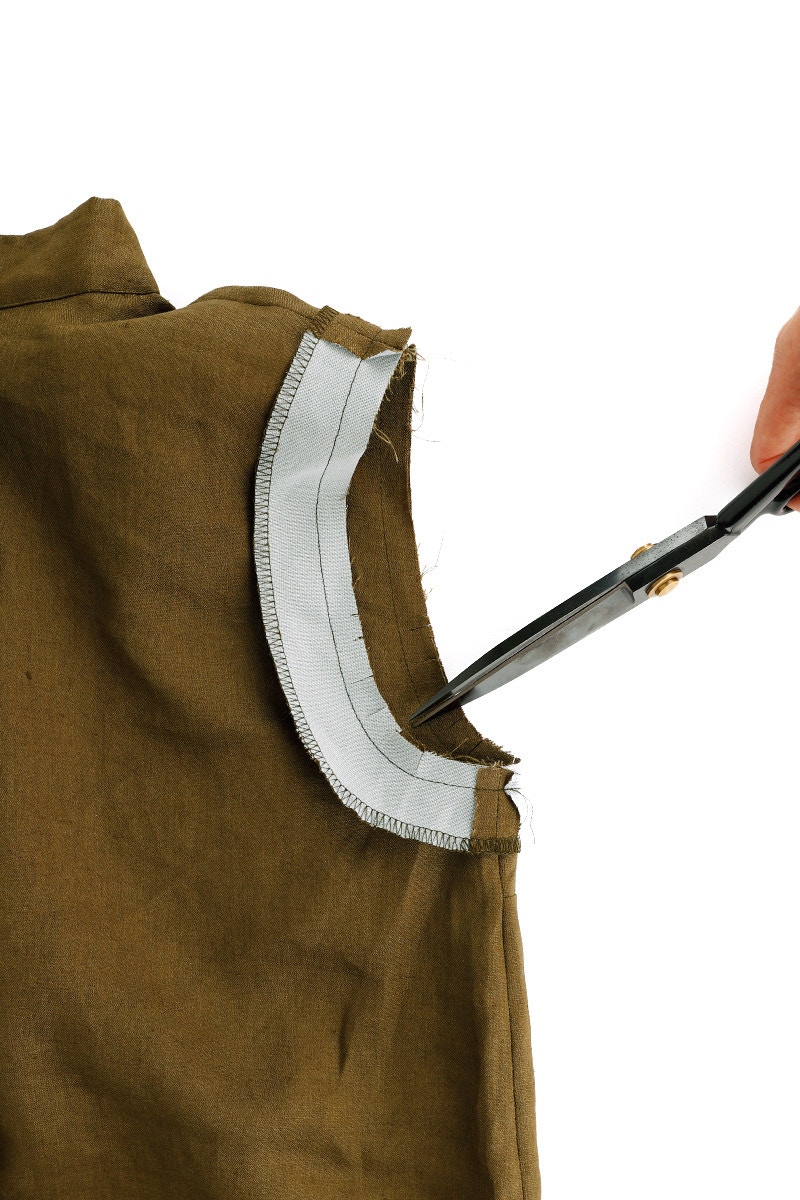
Next, clip the into the seam allowance at the curves, approximately 1cm apart. Take care not to cut through your stiching.


Now, under stitch on the facing and then press it to the wrong side of the garment. Pin the facing to the garment to hold it in place.


Ditch stitch at the shoulder and underarm seams to secure the armhole facing to the bodice.
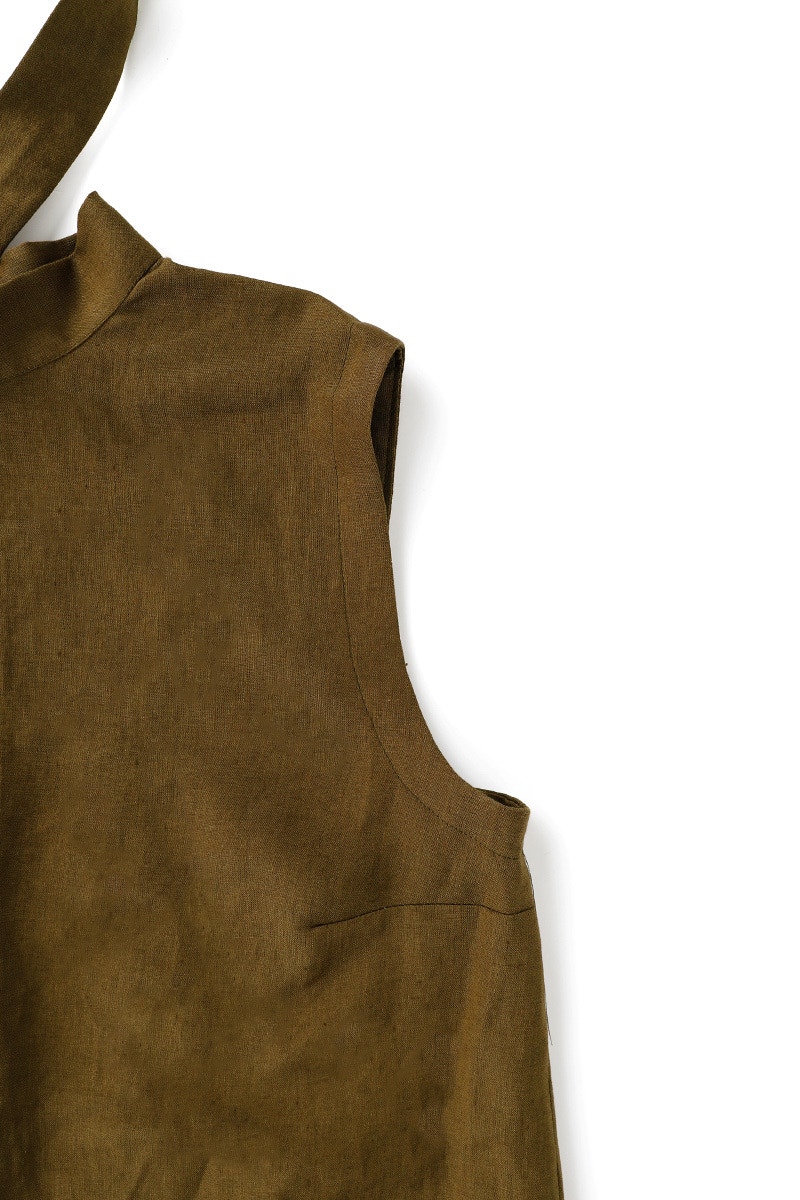
Now, top stitch the facing at 2cm from the edge. Repeat for the other side.
Next up, Sewing the Skirt or Peplum depending on which view you are making!
7 — Sewing the Skirt

First, we will construct the skirt back.
With right sides together pin one back skirt side panel to a skirt centre panel, matching the notches. Stitch, and then neaten the seam. Repeat for the other side panel. Press the seams towards the side panels.

Run two parallel lines of basting stitches, 6mm apart, at the waist edge of the skirt back. Use the longest stitch your machine has.
Next, pull the bobbin threads to gather the skirt until it is the same width as the waist edge on the bodice back.

Now we will sew the skirt front.
Place the pocket bag onto the front skirt side panel with the right sides together and pin together at notches marked ‘pocket opening’. Stitch a box from notch to notch, from the outside edge in towards the pocket bag 1cm. With needle down, turn 90 degrees and continue stitching at 1cm, parallel to the edge. Stitch down to line up with the lower notch, turn back towards outside and stitch towards the edge.

Next, mitre into the upper and lower corners of the box by snipping into each corner. Take care not to cut into your stitch line.

Fold entire pocket bag over towards the wrong side of the fabric and press along edge of pocket opening. Under stitch
the pocket opening from corner to corner.


Fold the pocket in half, right sides together. Pin the upper and lower pocket edges together, then stitch a 1cm seam across the top of the pocket bag to close it and a 1cm seam around the curved, lower edge of the pocket bag to close the base. Neaten the lower edge only. Baste the pocket to the skirt at the side seam above and below the pocket opening.
Repeat these steps for the other pocket. Remember to sew it as a mirror image so you have a pair!
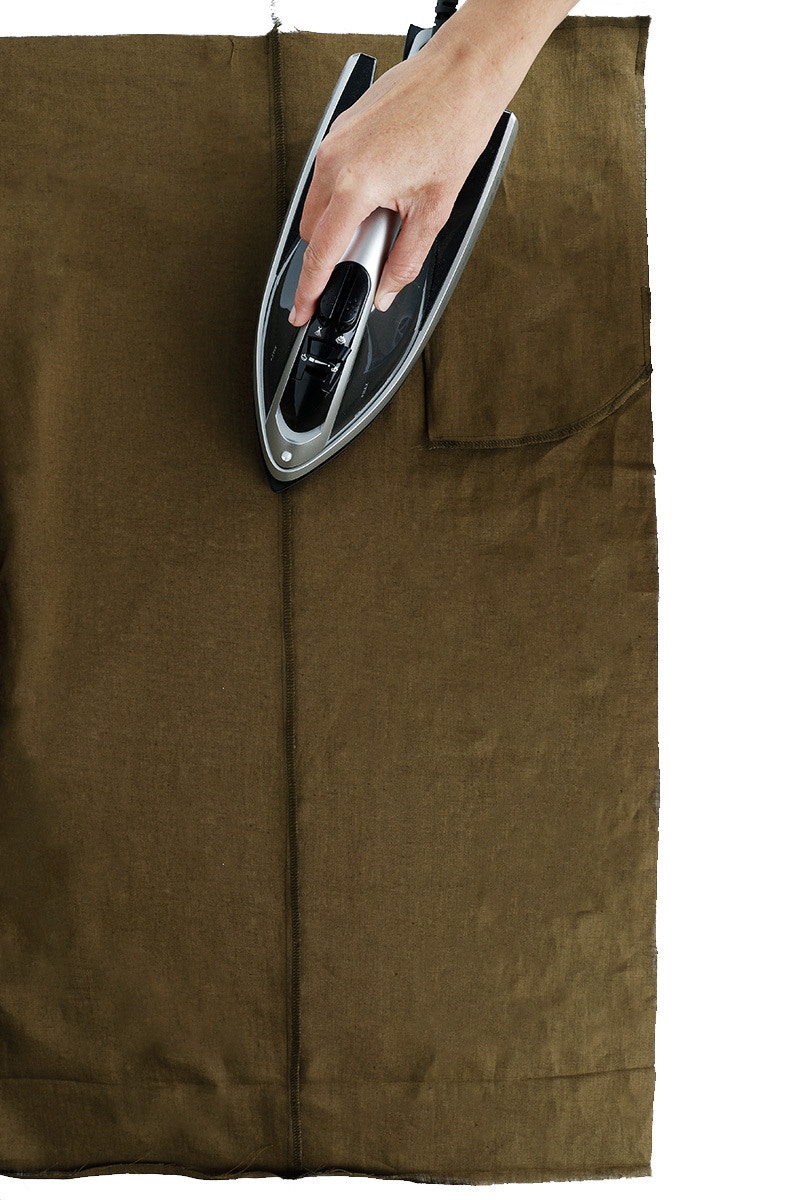
With right sides together, pin the unpocketed edge of the left front side panel to the left side of the front centre panel, matching the notches. Sew the seams and then neaten. Repeat for the other front side panel.
Press the seams towards the side seams.

Fold the pocket out of the way then run two parallel lines of basting stitches, 6mm apart, at the waist edge of the skirt front. Use the longest stitch your machine has. Do not catch the pocket with these stitches.
Next, pull the bobbin threads to gather the skirt until it is the same width as the waist edge on the bodice front.

With the right sides together, pin the skirt front to the skirt back at the side seams.

Stitch together using a 1cm seam. Take care near the pocket edge not to accidentally catch the pocket opening in this seam. You can either pin it back a little or tuck it out of the way as you get close to it.
Neaten the side seams then press them towards the back.

Now it is time to attach the skirt to the bodice!
With the right sides together, pin the skirt to the bodice, matching the notches and distributing the gathers evenly. Then, pin the pockets in place on top of the gathers.


Sew your skirt to the bodice and then neaten the seam.
Remove any visible gathering stitches and then press the seam up, towards the bodice.
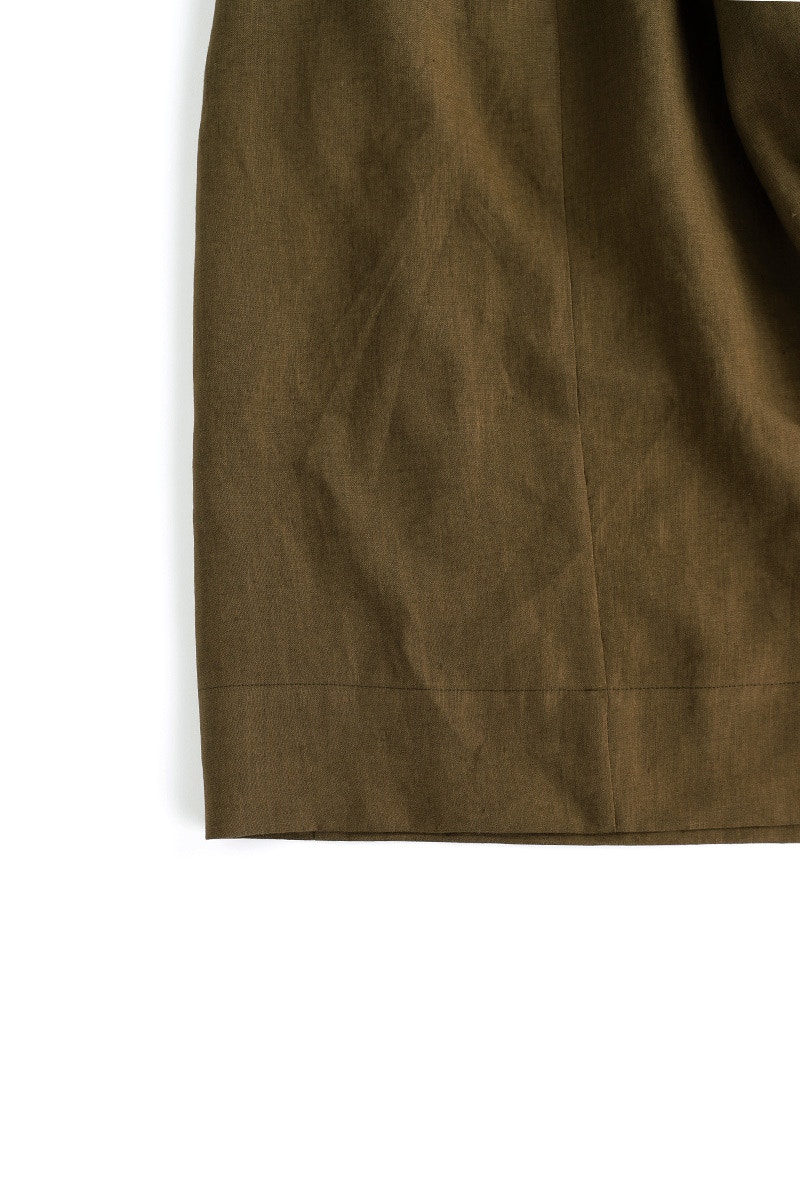
Finally, sew your skirt hem. Fold back the 1cm seam allowance, then fold up another 8cm for the hem. Pin the hem in place, then edge stitch to close.
8 — Sewing the Peplum
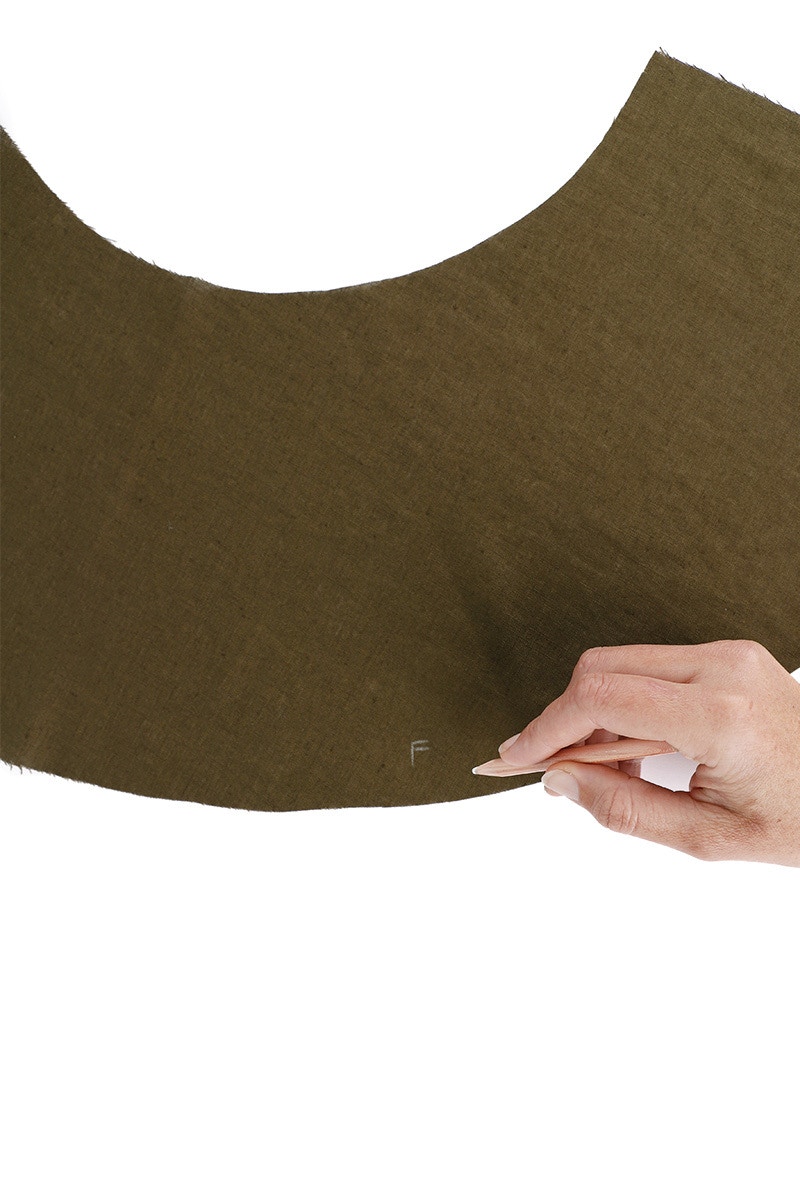

Before sewing your peplum, you may find it helpful to label your peplum facings so you don't get them mixed up with the outer peplum pieces. Do this on the wrong side so it won't be visible when you have finished sewing.
Then, stay stitch the waist edge of each peplum and peplum facing piece separately to prevent them from stretching out.
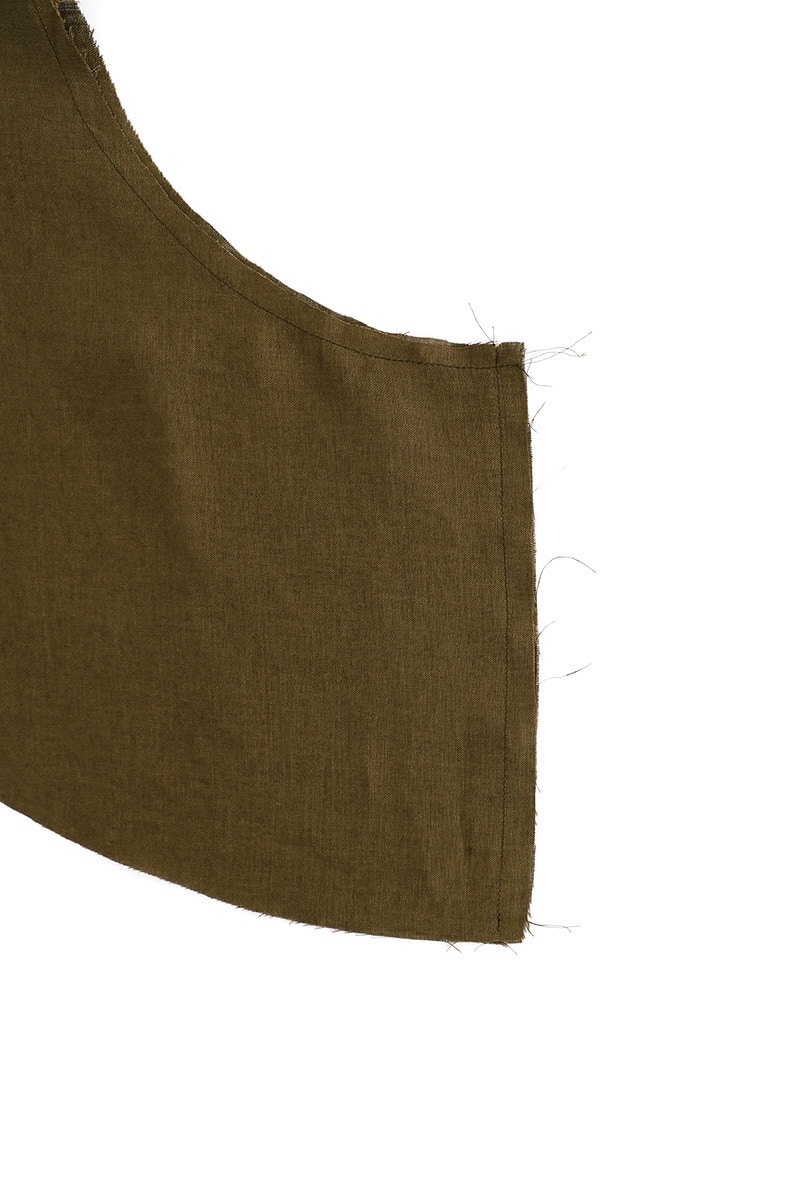
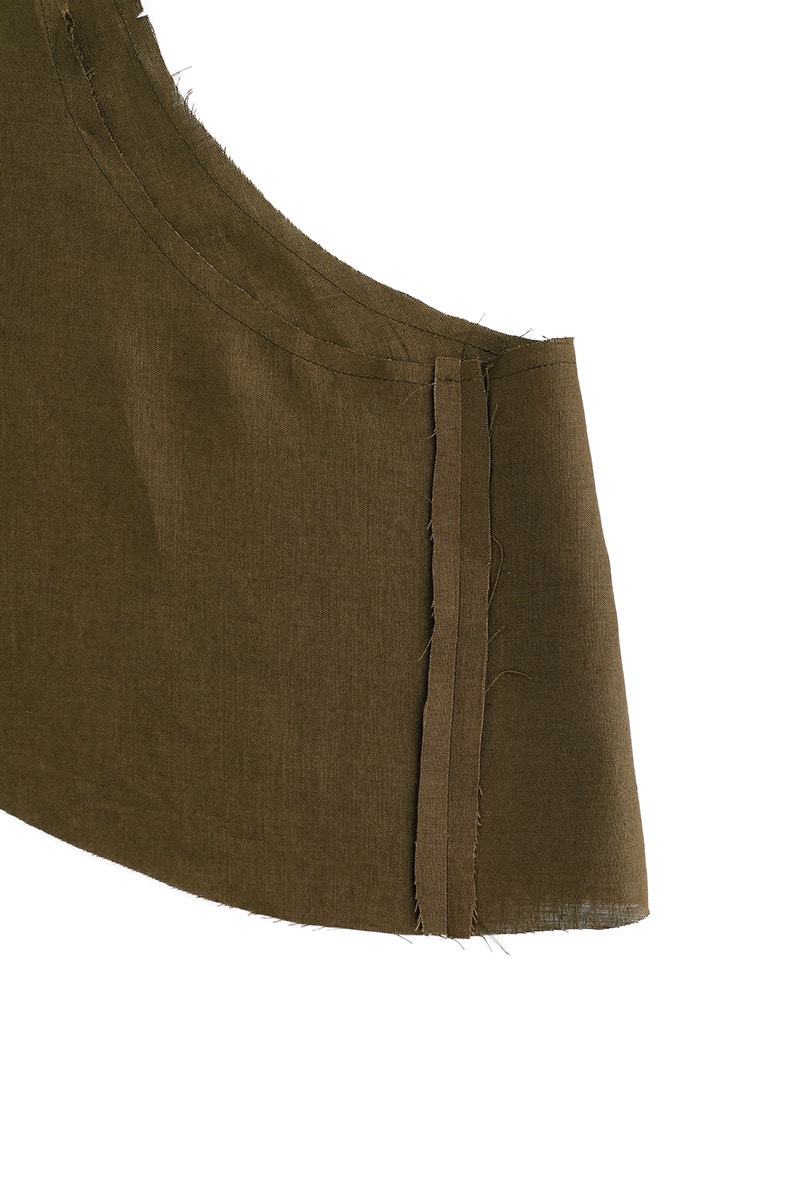
Now, with the right sides together, sew the side seams of the two peplum pieces together. Press the seams open.
Do the same with the peplum facing.

Pin the peplum to the peplum facing at the outer edge, with the right sides together and matching the side seams and notches. Sew the peplum to the peplum facing with a 6mm seam at the outer edge. Go slow when sewing this seam, and take care not to stretch out the hem edge.
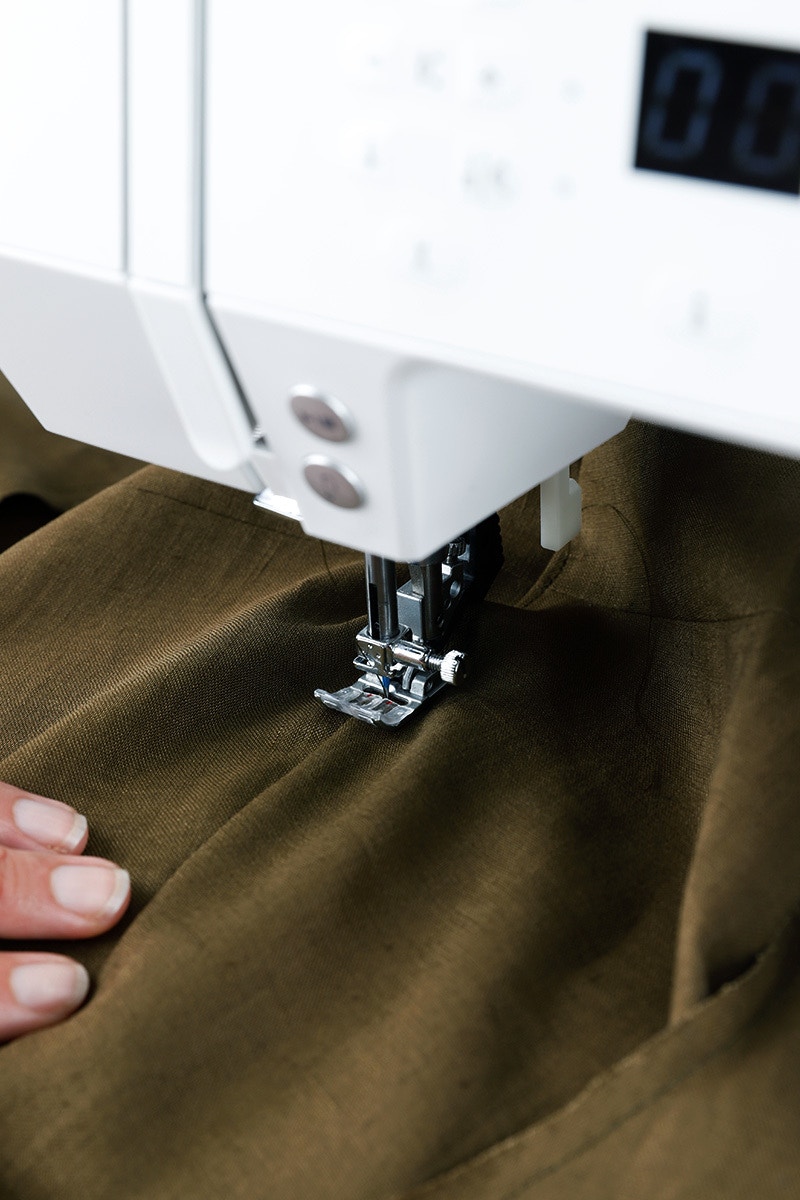
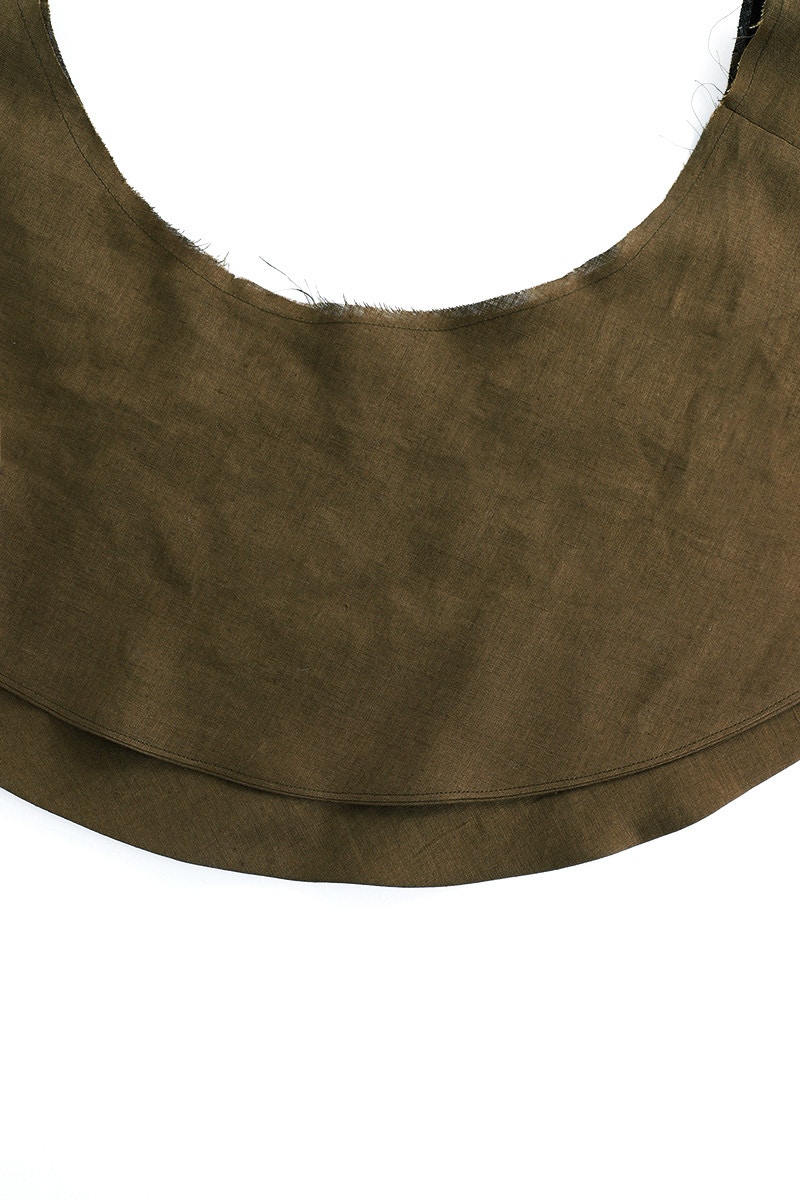
Turn the peplum right sides out and then under stitch on the peplum facing.
Give your peplum a press then baste the peplum to the peplum facing at the waist edge.

Pin the peplum to the bodice at the waist edge, with the right sides together. Sew them together with a 1cm seam and then neaten the raw edge.

Press this seam towards the bodice.
9 — Finishing touches

To keep your skirt or peplum seam allowance in place, back tack in the ditch 2-3 stitches at the bodice side seams and bodice centre back.
Our photo shows this on the Ivy Top, but it is the same for the Ivy Dress.

If you are sewing the Round Neck or Peter Pan Collar, sew a button at centre back, opposite your button loop.


If you are sewing the button cuff, sew a buttonhole on each cuff as, as per your machine’s settings. Use the buttonhole placement template as a guide.
Then sew a button on the tab, opposite the buttonhole.

Remove any visible basting or gathering stitches that remain and clip any loose threads.
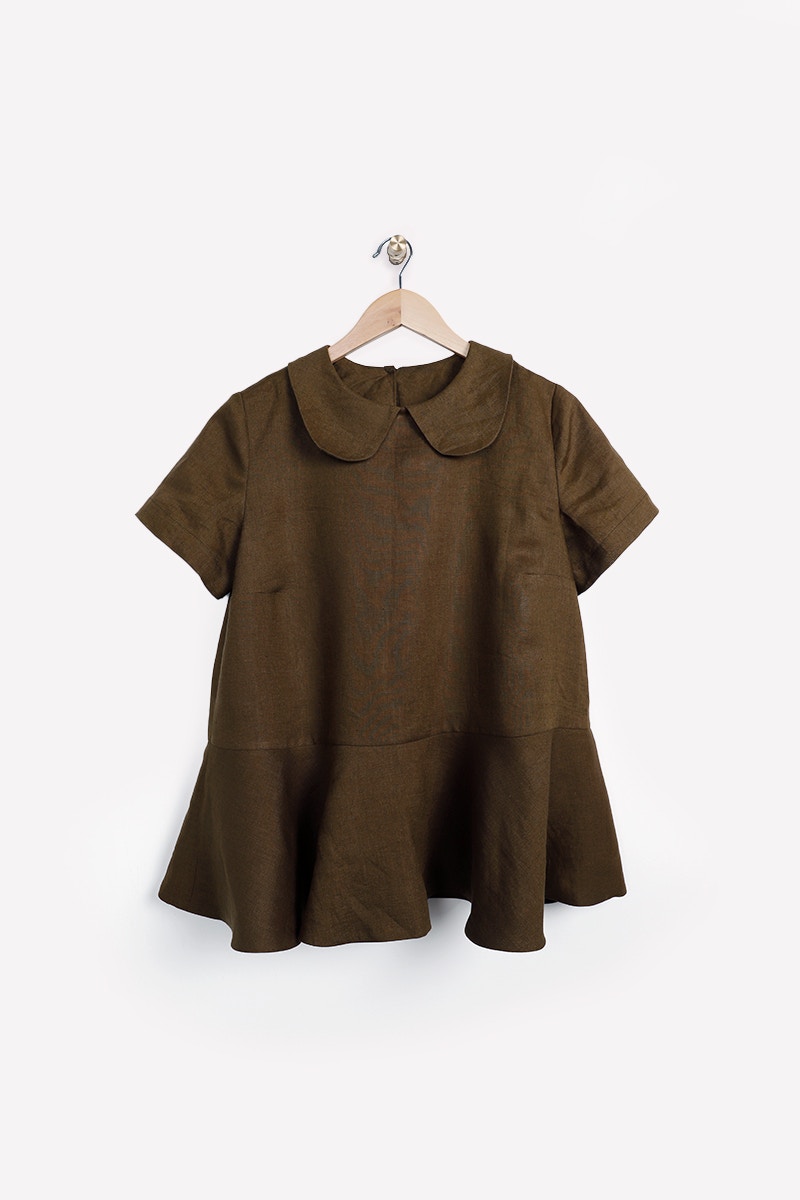

Give your Ivy Dress or Top a final press. You're all done!
Check out the Ivy Dress + Top pattern in our Online Store here. Don't forget you can always email us via patterns@thefabricstore.co.nz if you need advice!
Ivy makes from our wonderful community are also popping up over on Instagram, follow @makebytfs and use #TFSIvyDress or #TFSIvyTop so others can check out your creations!

